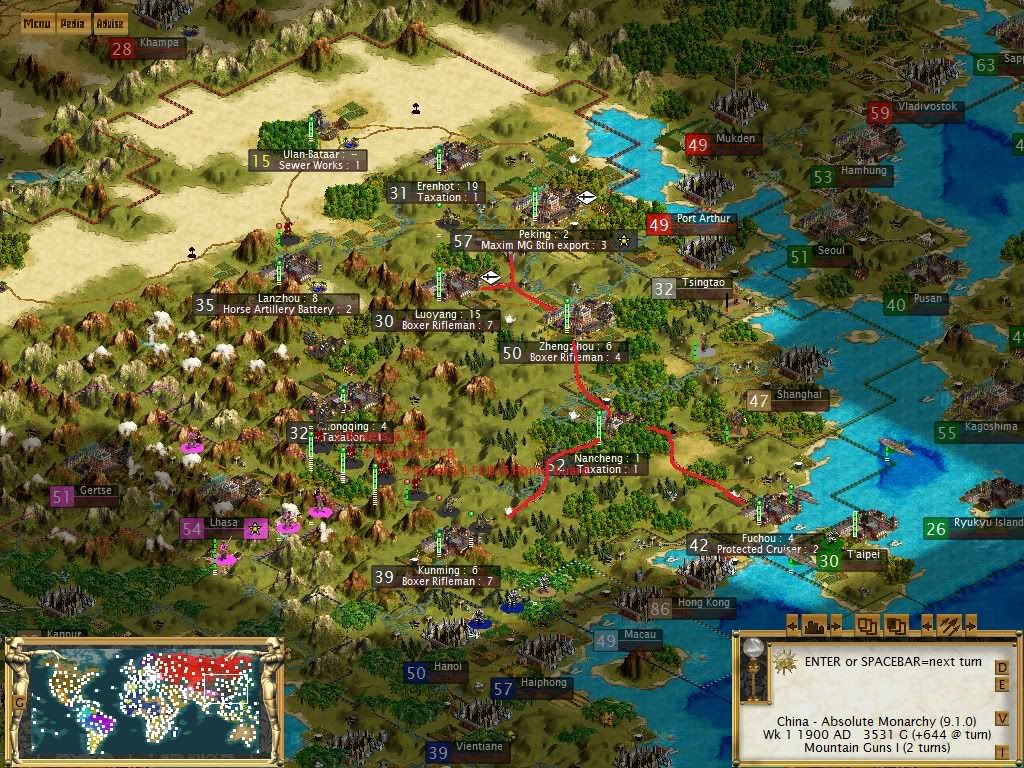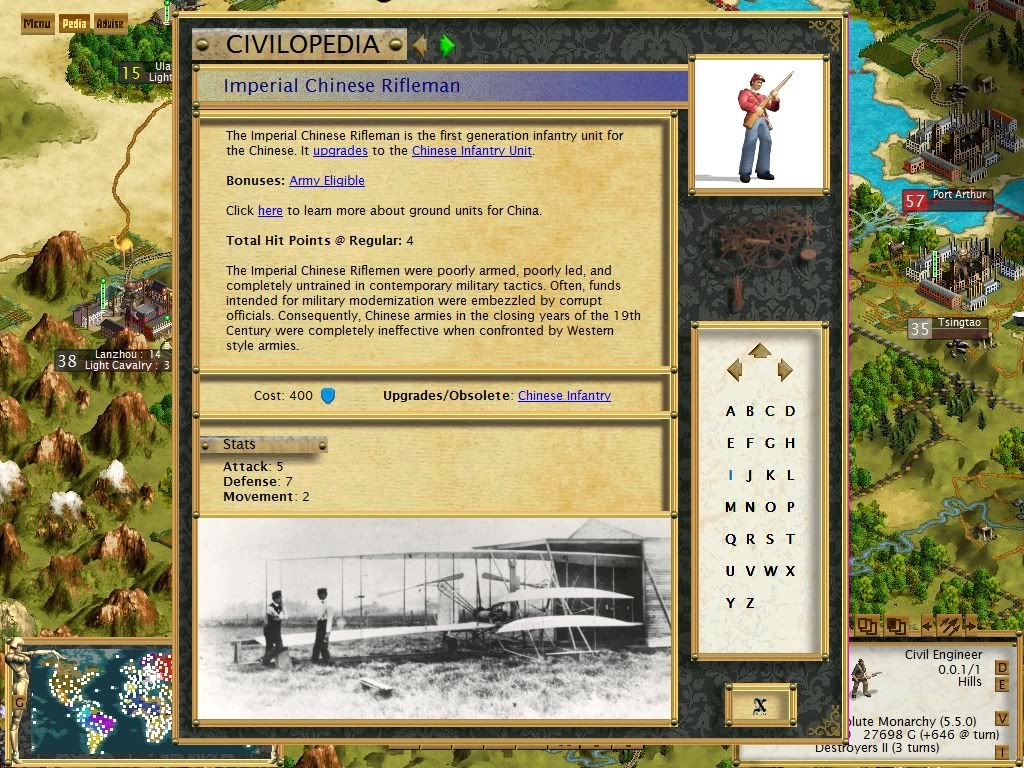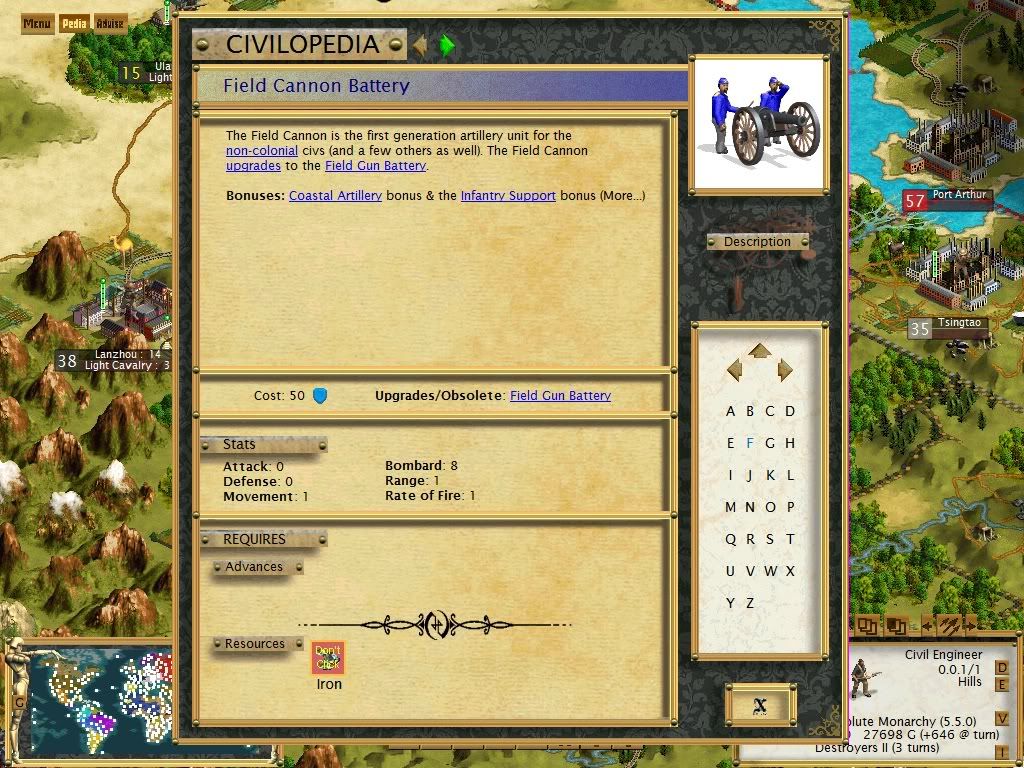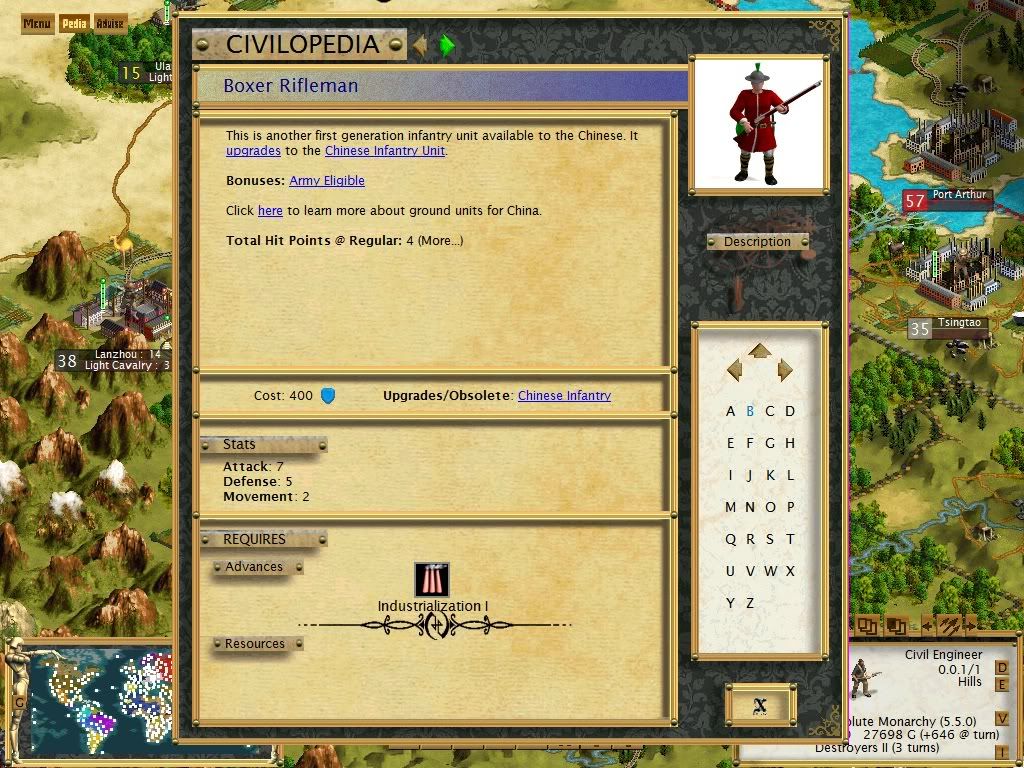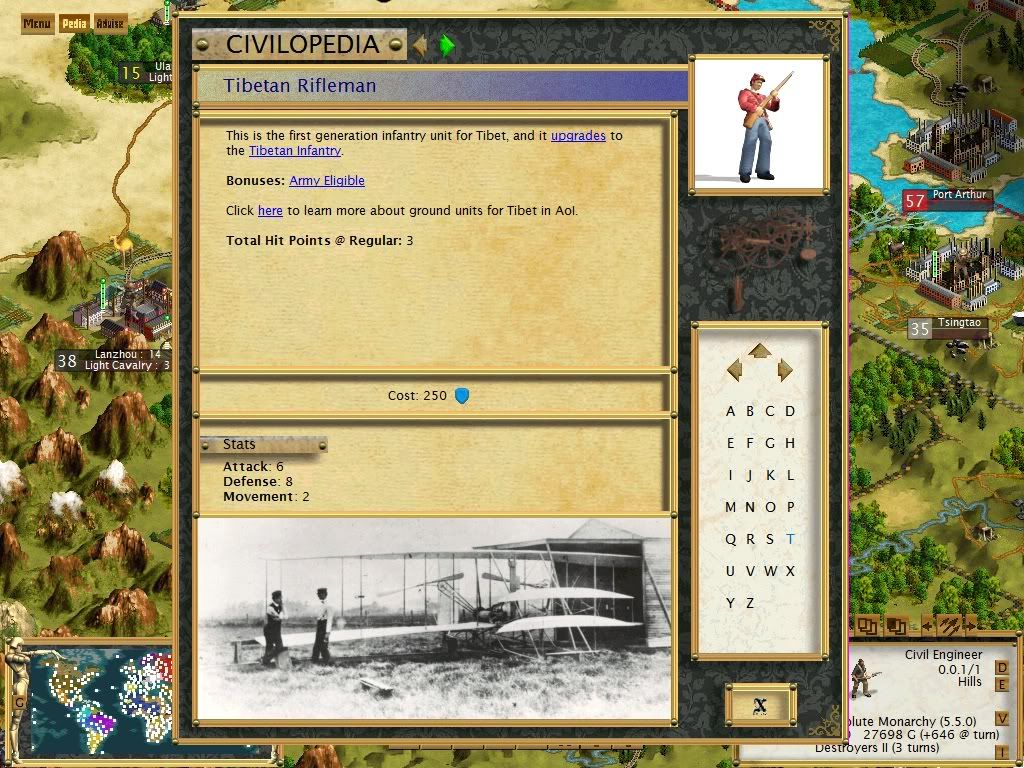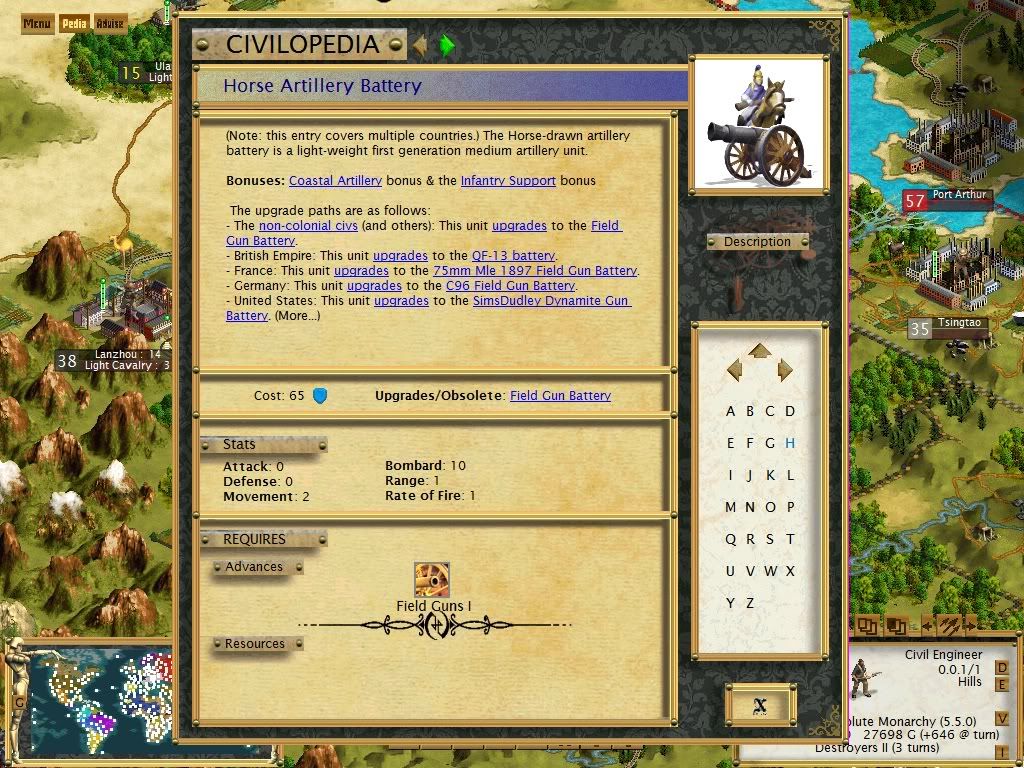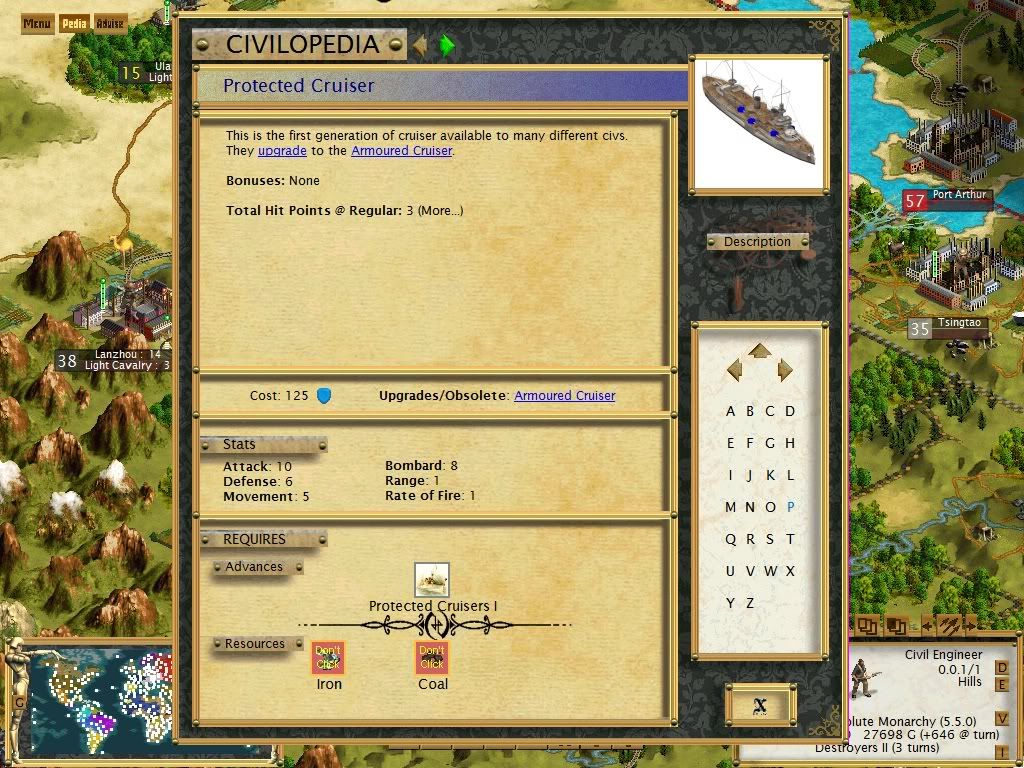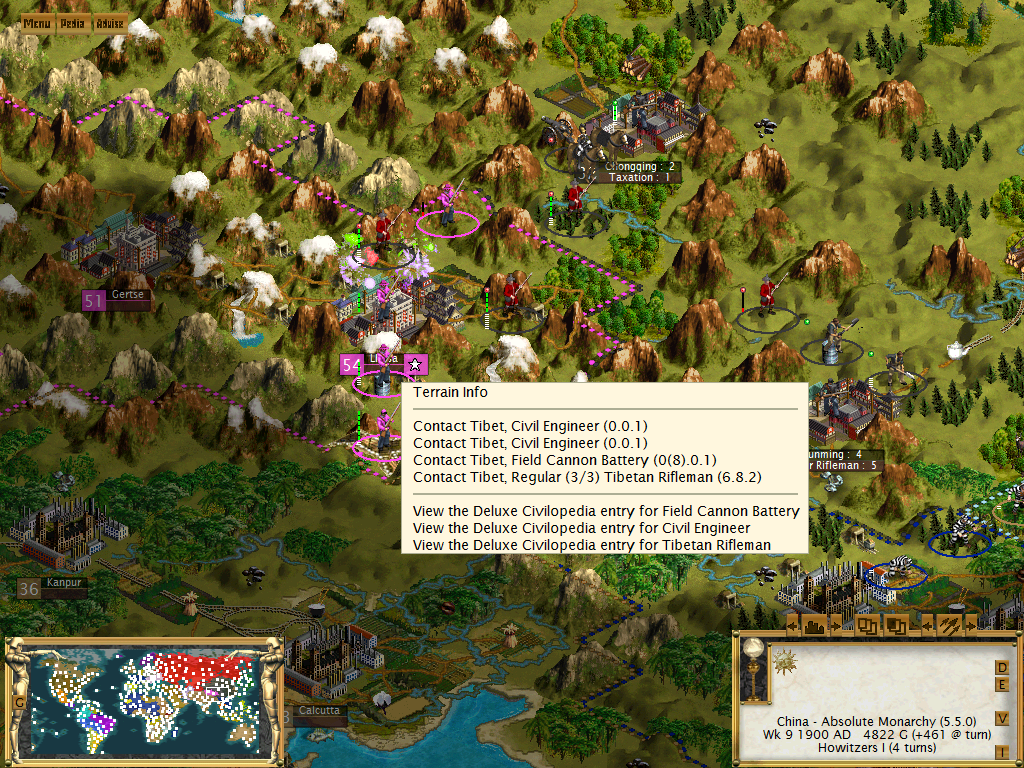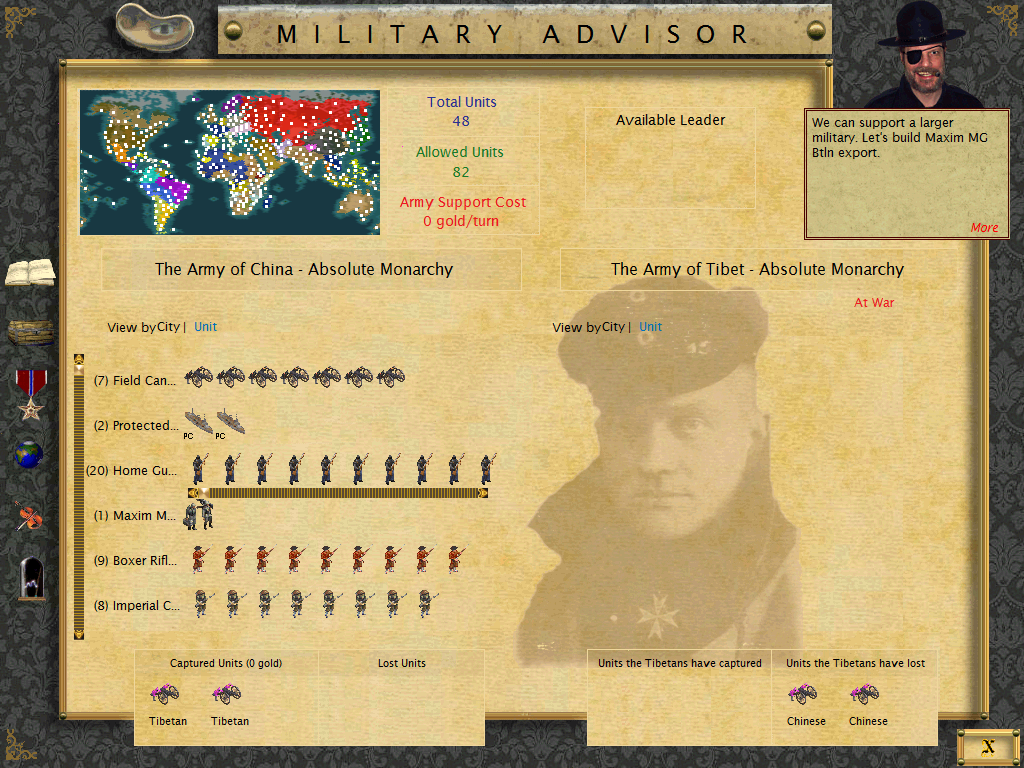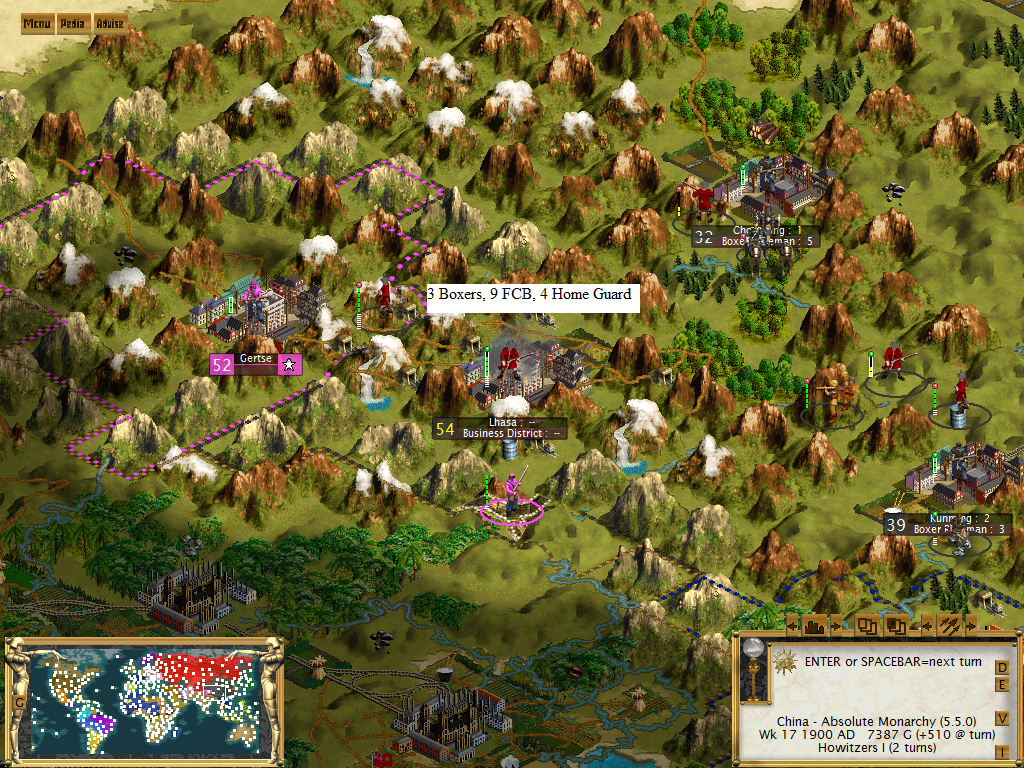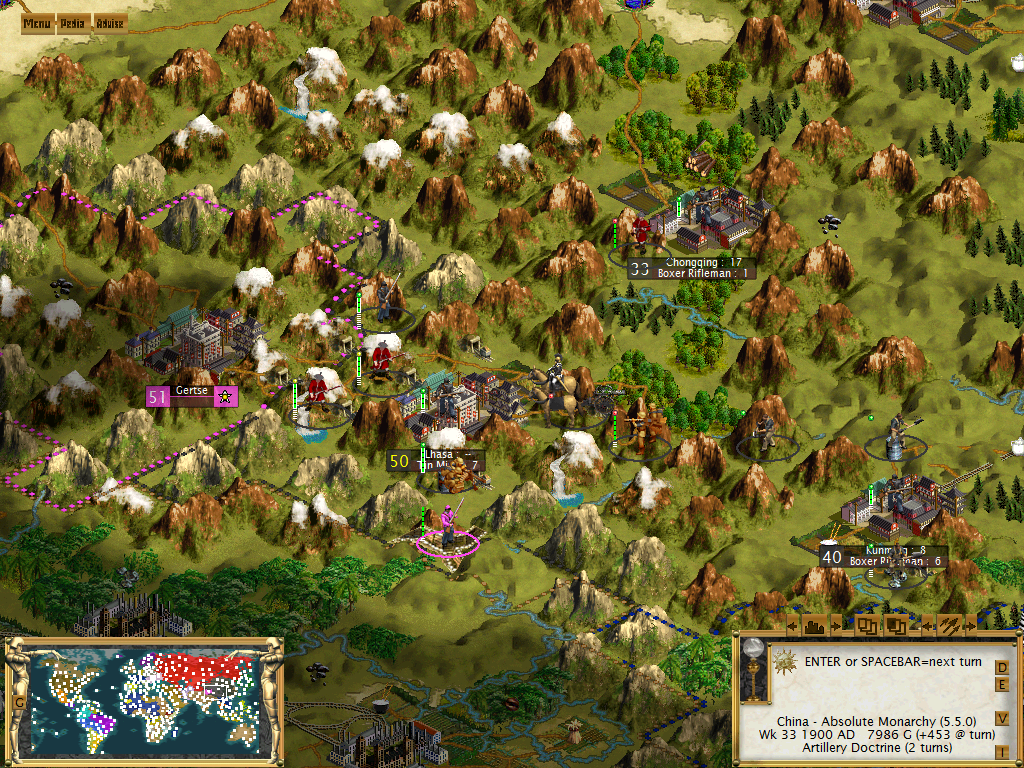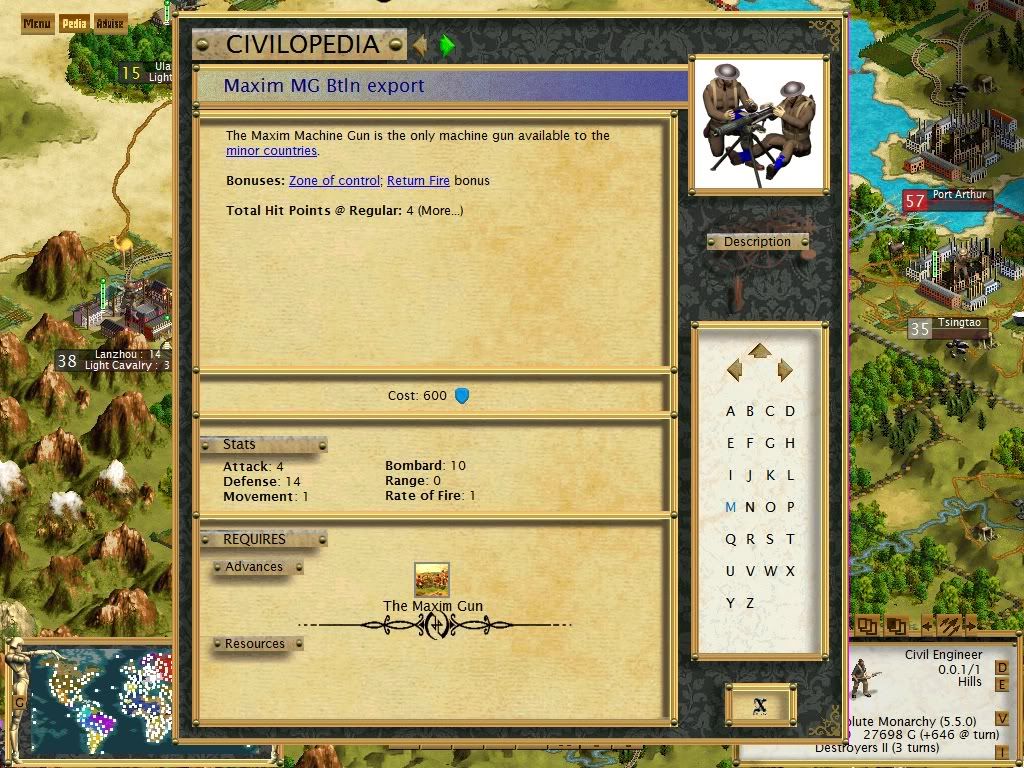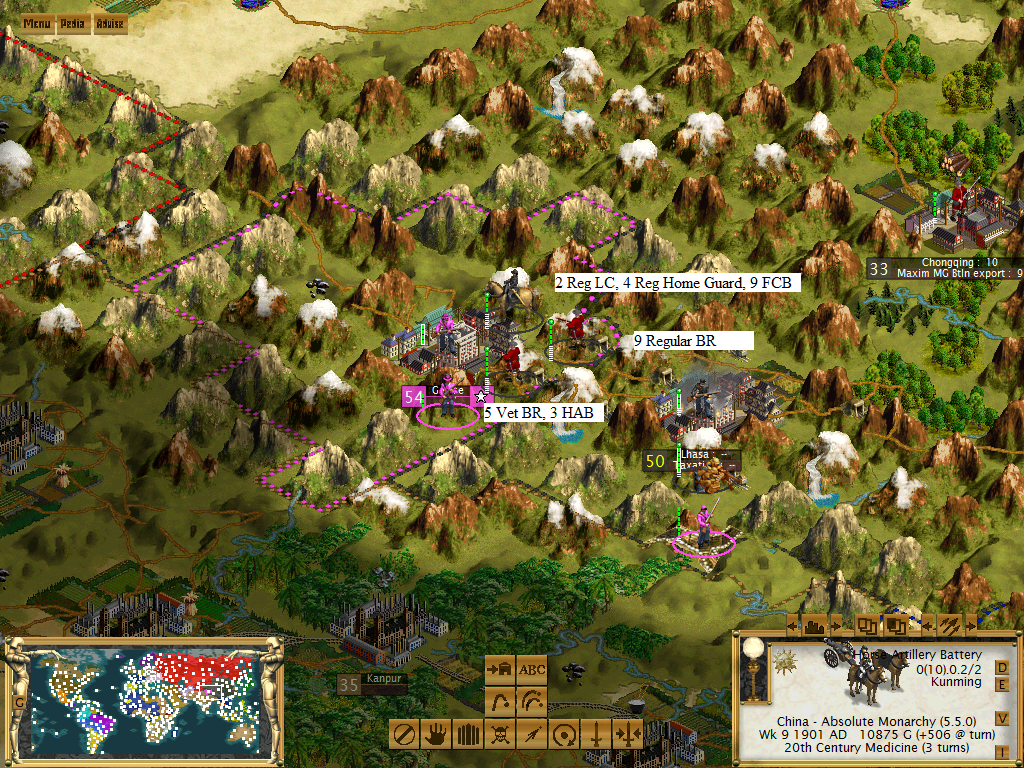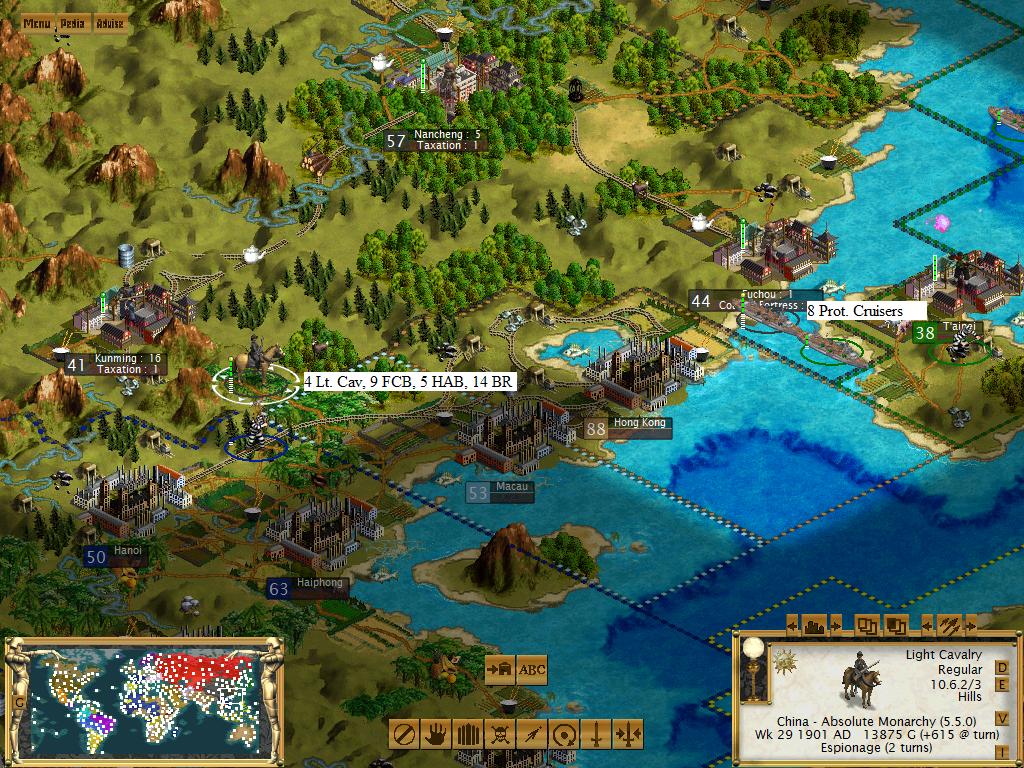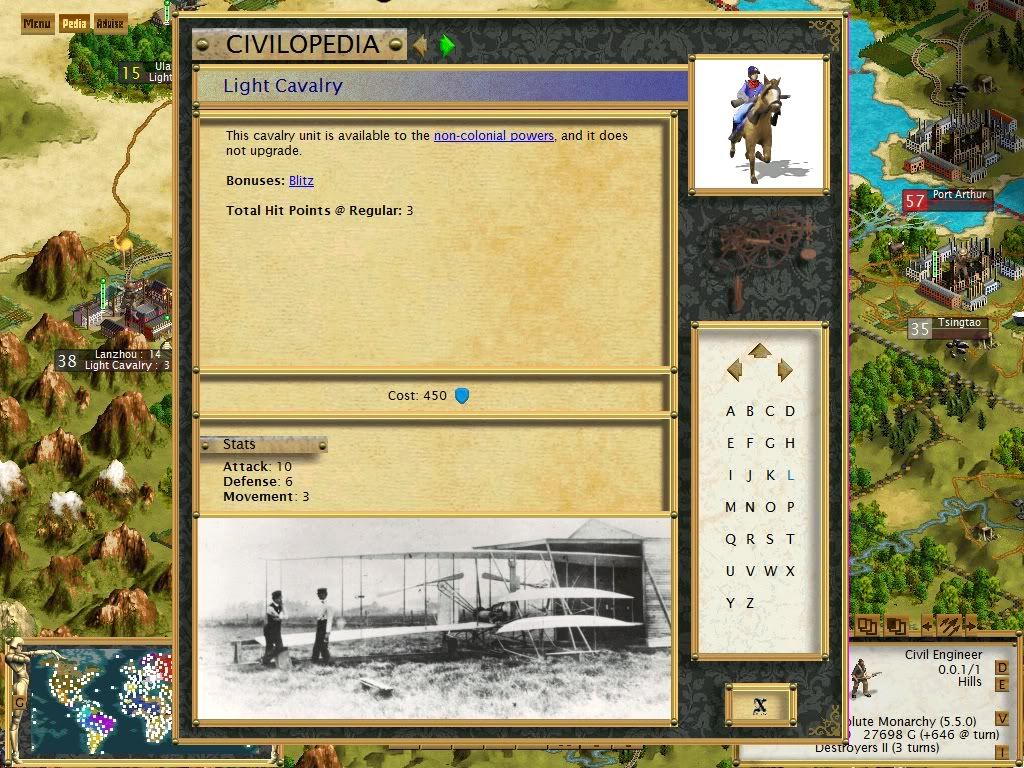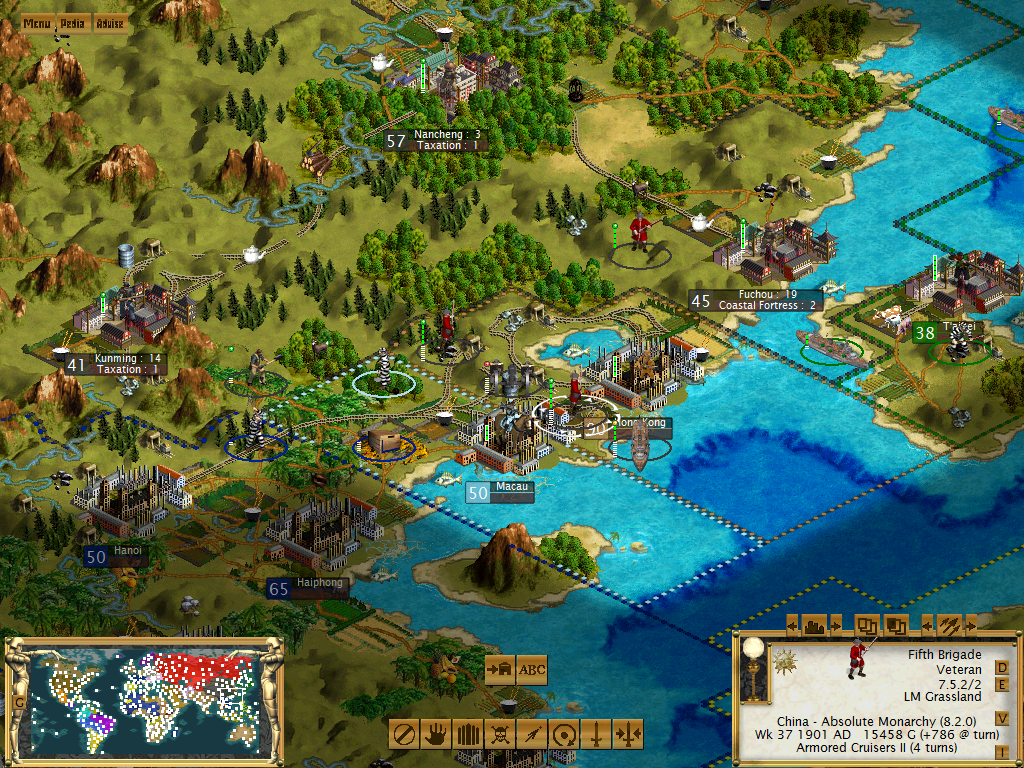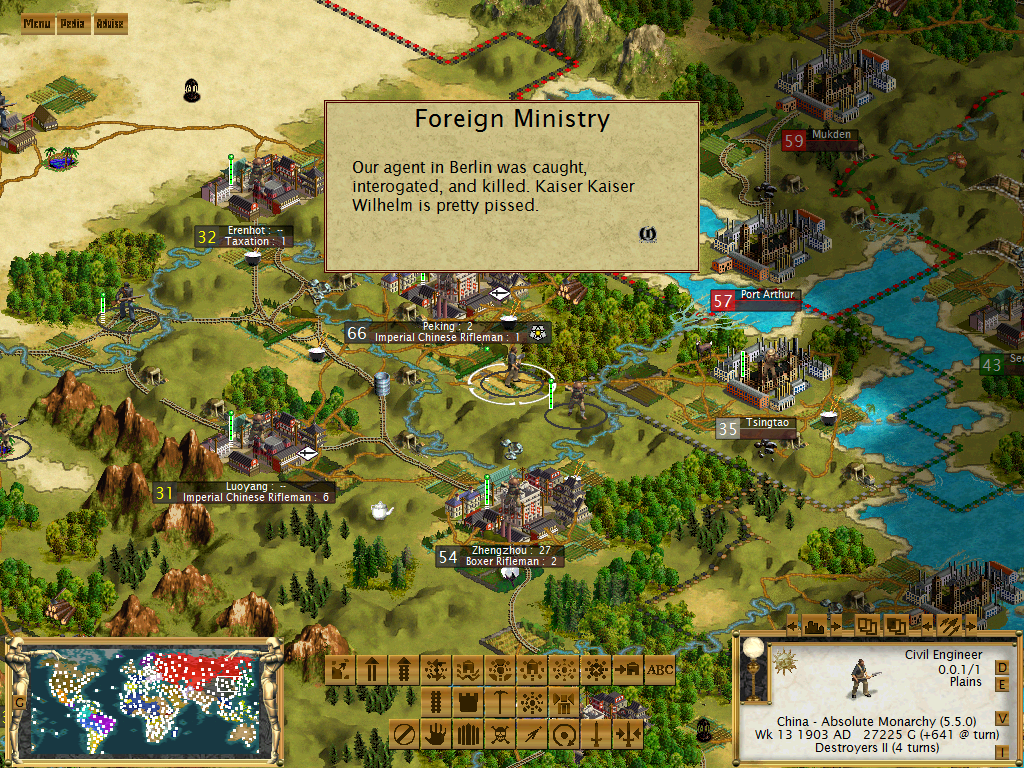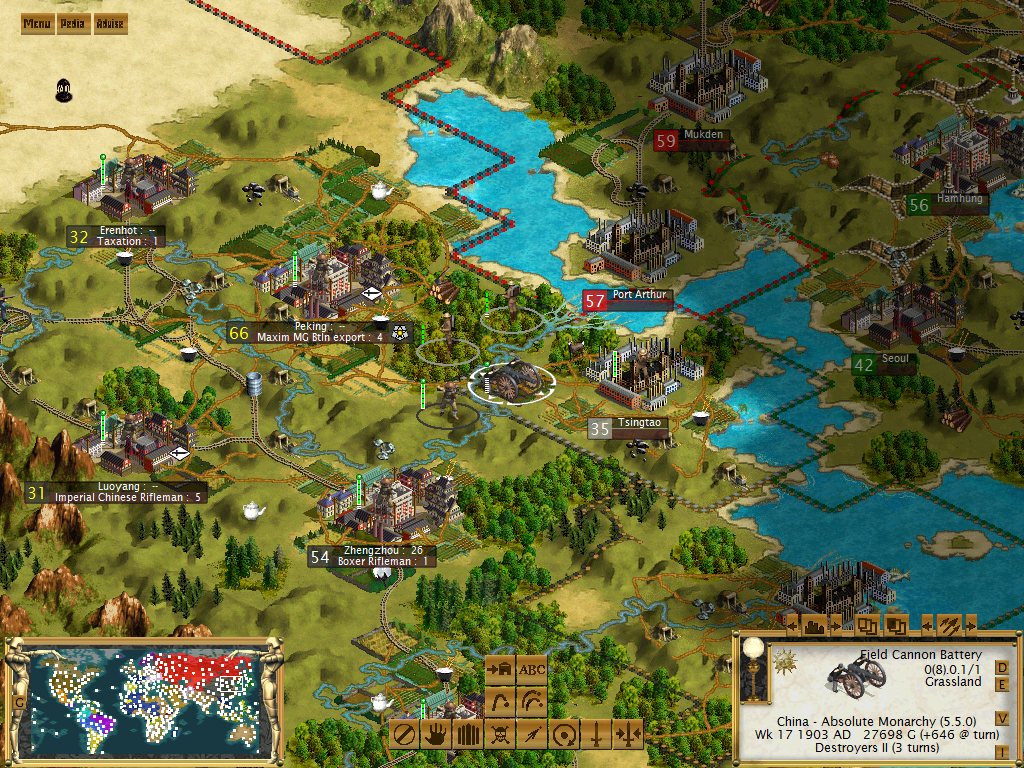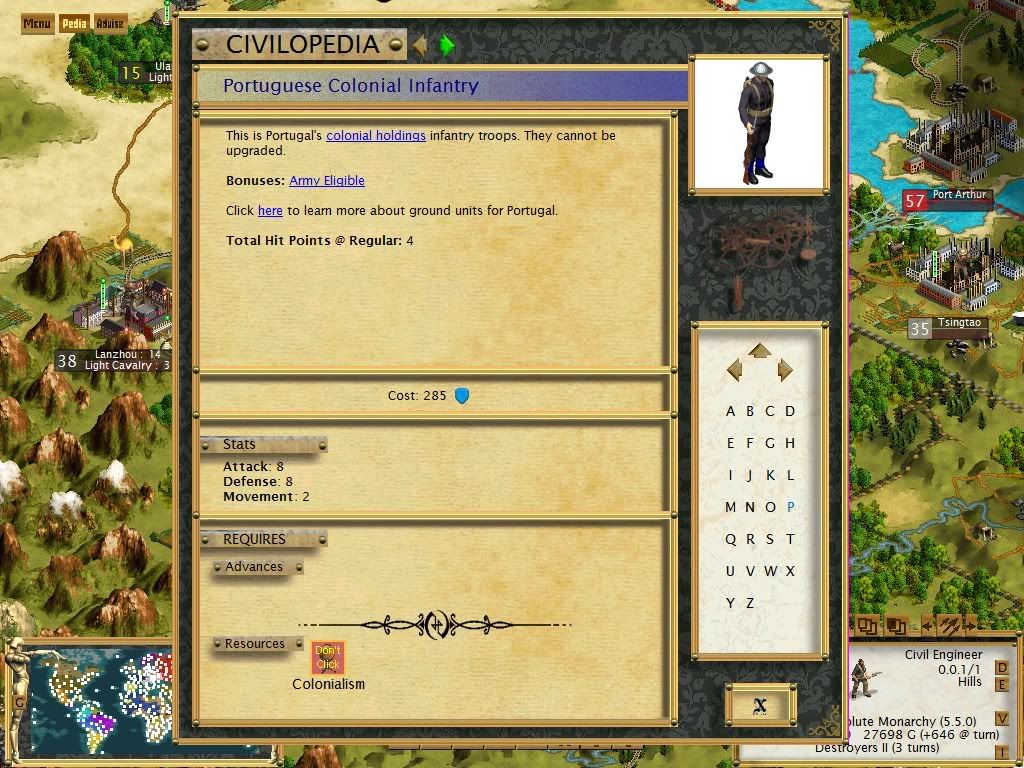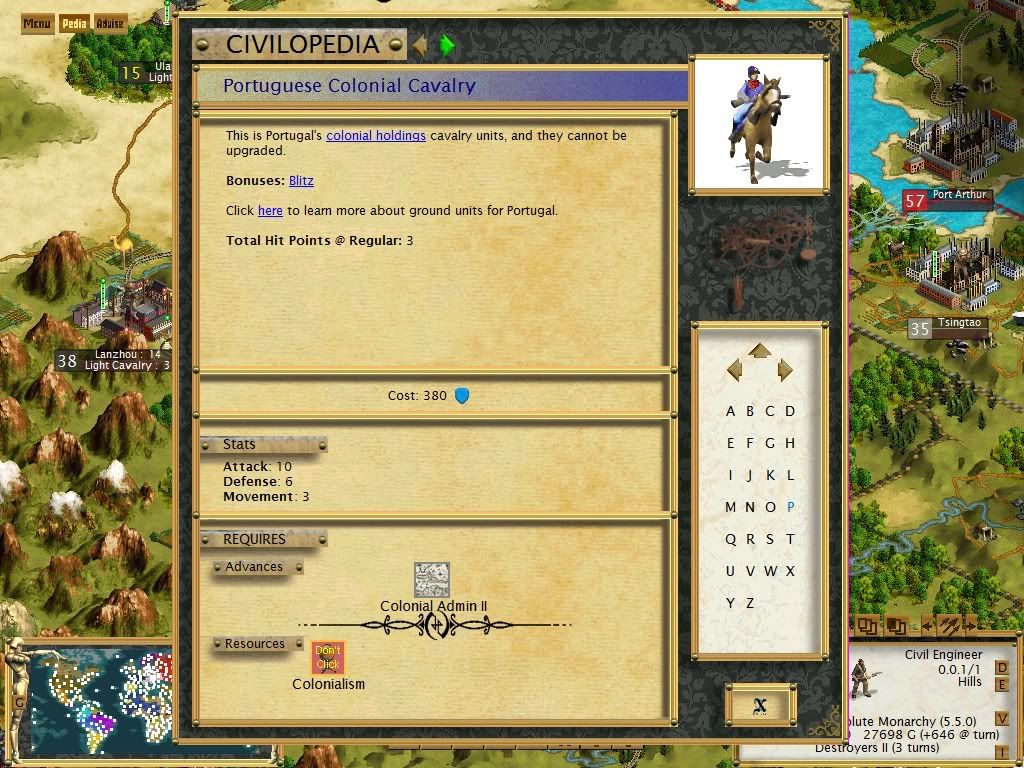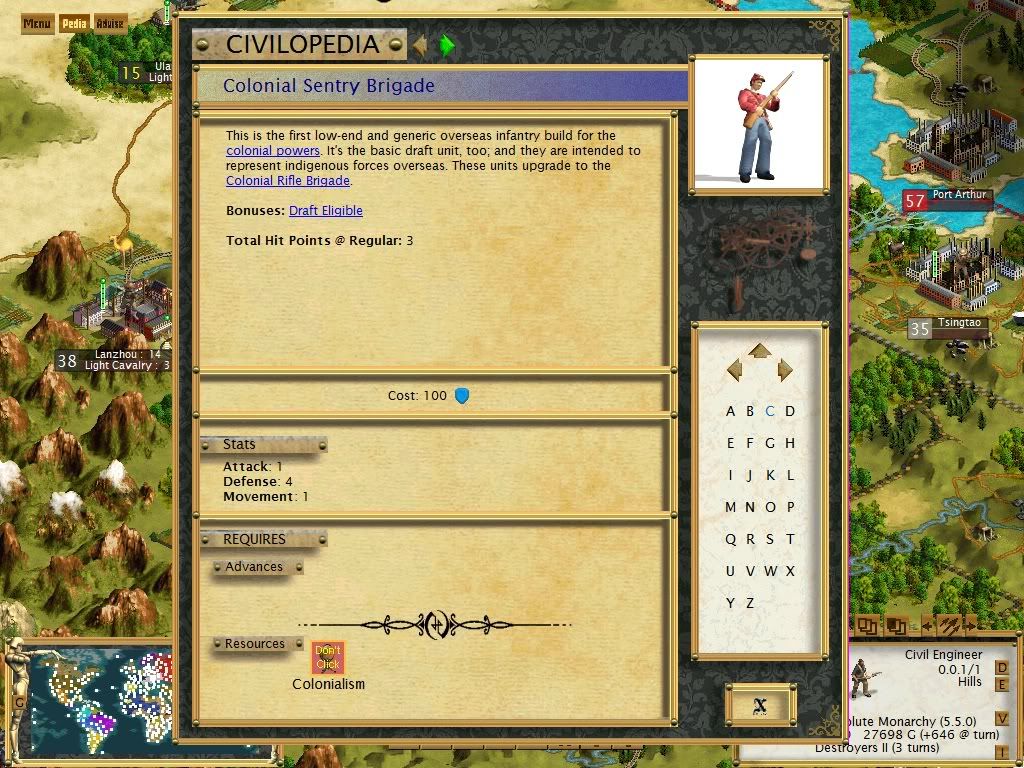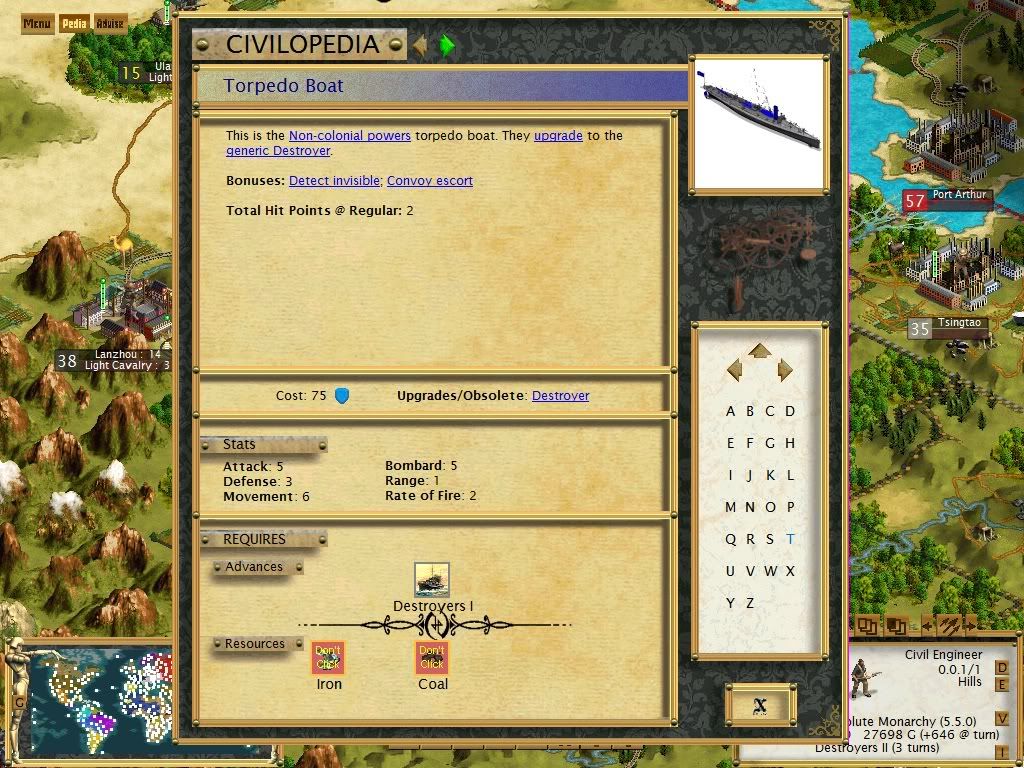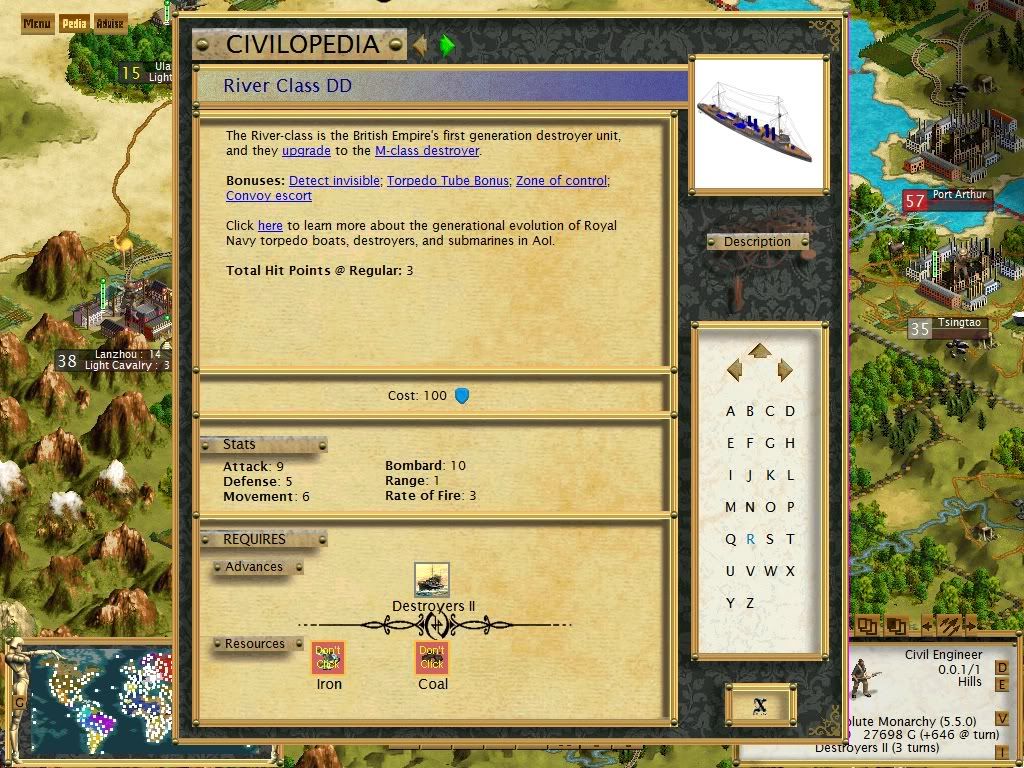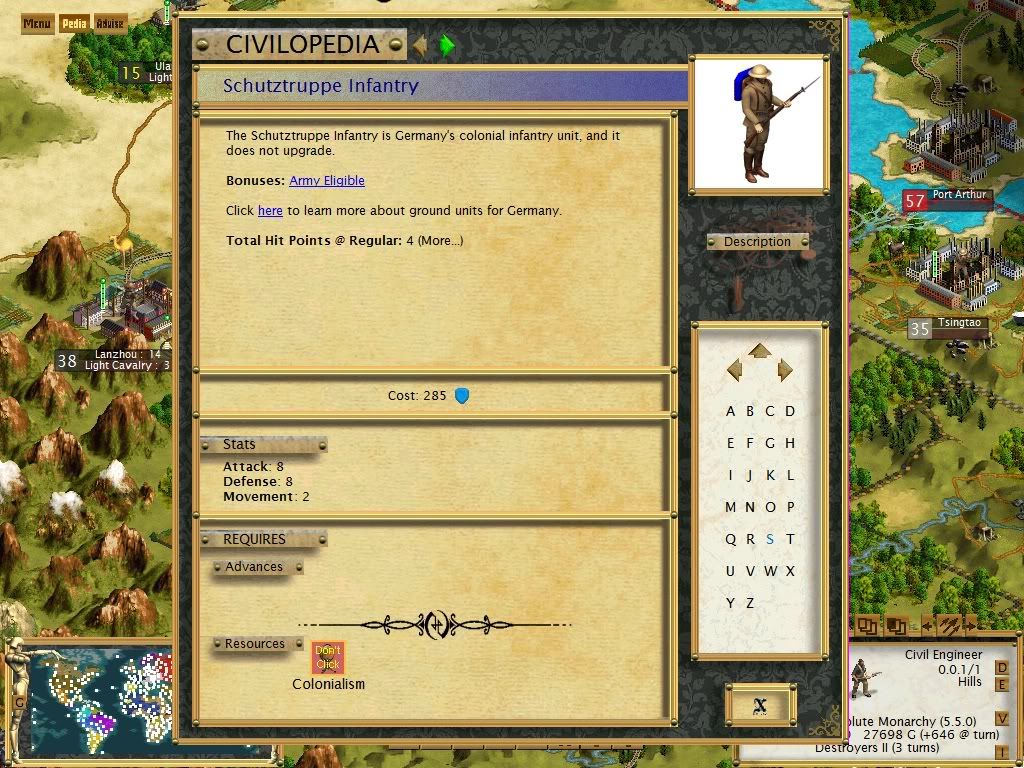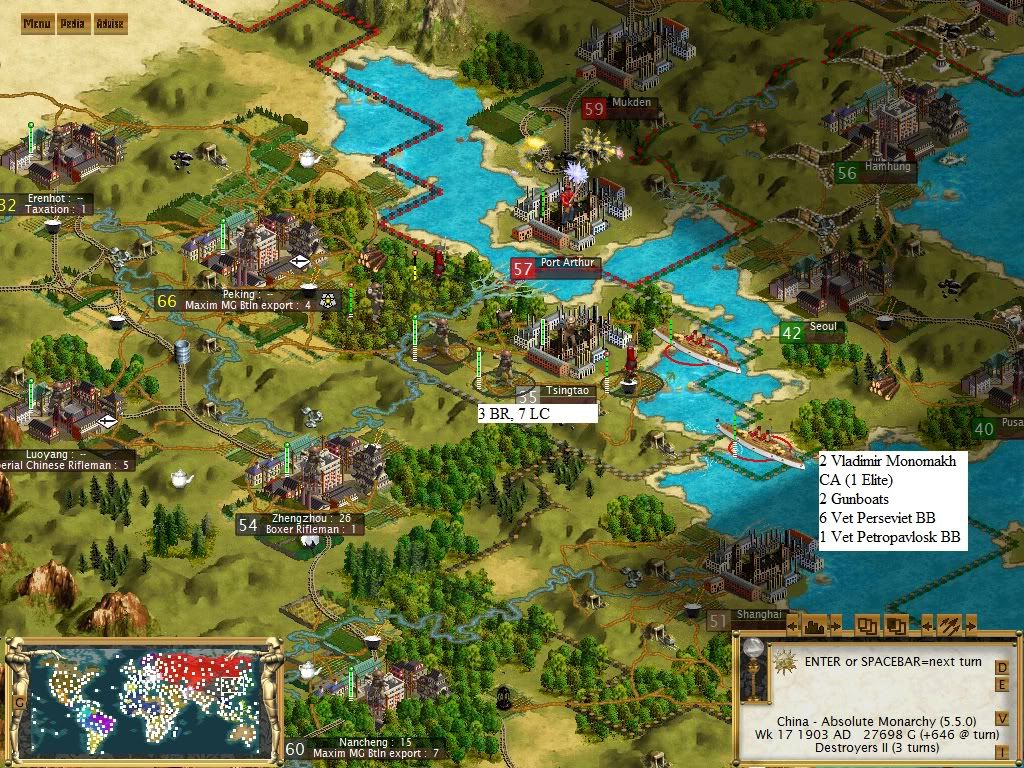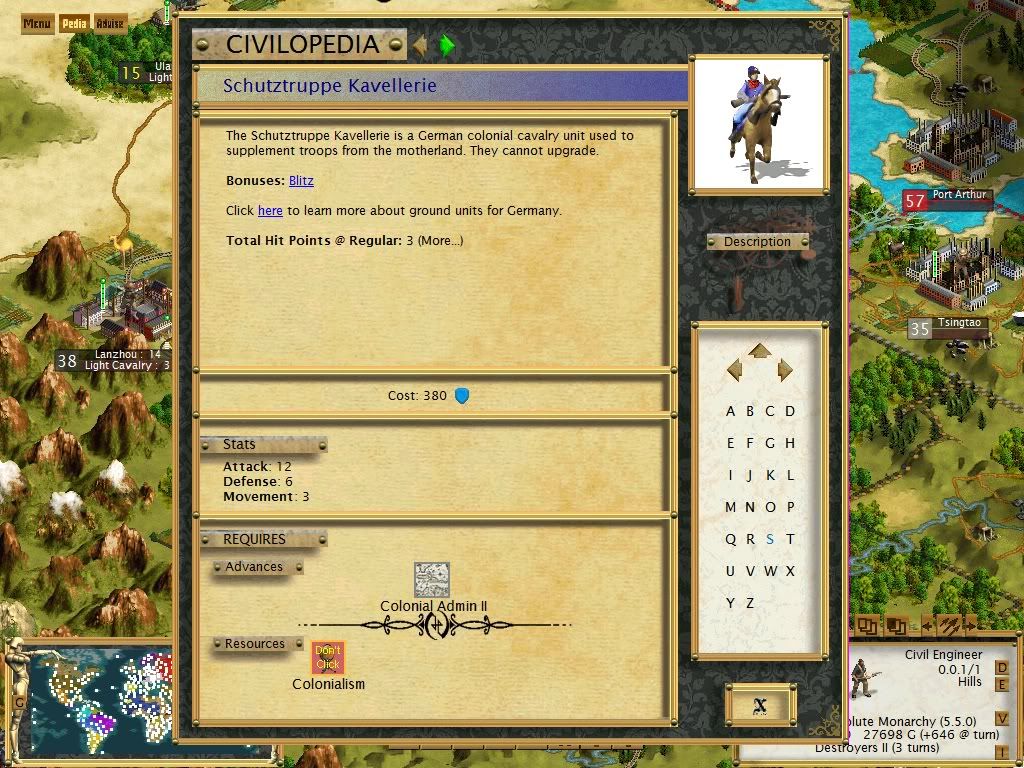ChaosArbiter
King
So, as I'm sure everyone can tell from the title, I'm doing an Age of Imperialism story, and I'm doing it as the Chinese. I'm sure my writing is terrible and horrible, but I'm going to subject anyone who reads this to it anyway  Anyway, I'm playing it on Chief Petty Officer/Regent, and it's likely to be my last game at that level (fitting, I think, since my first attempt at a story was supposed to be my first try at Regent ... I almost wish I'd kept that one going). Some Author's notes:
Anyway, I'm playing it on Chief Petty Officer/Regent, and it's likely to be my last game at that level (fitting, I think, since my first attempt at a story was supposed to be my first try at Regent ... I almost wish I'd kept that one going). Some Author's notes:
On Unit Size:
Imperial Chinese Riflemen Division = 6,000
Boxer Riflemen Brigade = 6,000
Light Cavalry Regiment = 4,000
Company = 500 soldiers
MG Battalion = 800
Chinese Infantry Division = 9,000
All these are "paper numbers" that refer to number of effective soldiers, and thus doesn't count camp followers or support personnel. For those who don't know, the ICR is the first real Infantry unit the Chinese get and is primarily defensive; the Boxer Riflemen are available about halfway through the first age and have reversed A/D stats, making them slightly better at attacking. Light Cavalry have much better Attack (and slightly better Defense than the BR), but have -1 HP compared to them. I'm also only going to recruit them from a few areas. Maxim Machine Gun Battalions have awesome Defense, horrible Attack, and are terribly expensive (comparatively speaking). Chinese Infantry are available with the 'Great War' tech at the end of the second age, and are actually halfway decent units. Finally, I've segregated the unit organization (Regiment, Brigade, Division) primarily because the Protagonist, being a member of the Chinese Armed Forces, will not refer to the Boxer Riflemen as "Boxer Riflemen" but as Rifle Brigades, and the ICR as Riflemen Divisions - this because he's a jerk, and he doesn't like the unofficial status the Boxers have. I am currently unsure as to the size of Artillery Batteries/Brigades.
Gold "tons" are 1/10 the amount of gold given - 9.7 tons = 97 Gold. This is just me being arbitrary. I'm weird like that.
In-Character Author is named Ygorl Ssendam. If anyone has read my first - aborted - story, you might remember the name "Ssendam." People who know where I got those names or what they may signify may show up in-story, although I'm currently unsure as to where (Cruiser and Destroyer ship names, my primary vessels, are already taken).
Anything else .... Well, maybe a few things that might get added here as time goes by. Probably people who've gotten the above and/or otherwise deserve to be in the story somehow. Few-to-no Images as yet, I may take a page from Brucha and add in Unit Civiliopedia entries, but they're likely to just be used as Strategic Planning (I'm not as awesome as to include Tactical levels like him!), or random images I think fit in with the story (you're welcome to chime in for ideas).
Right now:
Corps Units:
1) The Black Company (unassigned)
2) Force Ten (unassigned)
Finally:
http://forums.civfanatics.com/showthread.php?t=95741
The Age of Imperialism thread itself. You guys don't think I'd forget that, do you?
Story begins in Post 2.
EDIT: In case someone's interested in who-all is building what wonders (and there are several I haven't mentioned in the story) and anything else, I'm adding my turnlog here:
Also, as vmxa suggested, after each new update, any screenshots in previous updates will be placed in Spoiler tags. I'm also going to try to put the Civilopedia files for each new unit at the end of the post in which they appear, but I don't know how long I'll keep that up
 Anyway, I'm playing it on Chief Petty Officer/Regent, and it's likely to be my last game at that level (fitting, I think, since my first attempt at a story was supposed to be my first try at Regent ... I almost wish I'd kept that one going). Some Author's notes:
Anyway, I'm playing it on Chief Petty Officer/Regent, and it's likely to be my last game at that level (fitting, I think, since my first attempt at a story was supposed to be my first try at Regent ... I almost wish I'd kept that one going). Some Author's notes:On Unit Size:
Imperial Chinese Riflemen Division = 6,000
Boxer Riflemen Brigade = 6,000
Light Cavalry Regiment = 4,000
Company = 500 soldiers
MG Battalion = 800
Chinese Infantry Division = 9,000
All these are "paper numbers" that refer to number of effective soldiers, and thus doesn't count camp followers or support personnel. For those who don't know, the ICR is the first real Infantry unit the Chinese get and is primarily defensive; the Boxer Riflemen are available about halfway through the first age and have reversed A/D stats, making them slightly better at attacking. Light Cavalry have much better Attack (and slightly better Defense than the BR), but have -1 HP compared to them. I'm also only going to recruit them from a few areas. Maxim Machine Gun Battalions have awesome Defense, horrible Attack, and are terribly expensive (comparatively speaking). Chinese Infantry are available with the 'Great War' tech at the end of the second age, and are actually halfway decent units. Finally, I've segregated the unit organization (Regiment, Brigade, Division) primarily because the Protagonist, being a member of the Chinese Armed Forces, will not refer to the Boxer Riflemen as "Boxer Riflemen" but as Rifle Brigades, and the ICR as Riflemen Divisions - this because he's a jerk, and he doesn't like the unofficial status the Boxers have. I am currently unsure as to the size of Artillery Batteries/Brigades.
Gold "tons" are 1/10 the amount of gold given - 9.7 tons = 97 Gold. This is just me being arbitrary. I'm weird like that.
In-Character Author is named Ygorl Ssendam. If anyone has read my first - aborted - story, you might remember the name "Ssendam." People who know where I got those names or what they may signify may show up in-story, although I'm currently unsure as to where (Cruiser and Destroyer ship names, my primary vessels, are already taken).
Anything else .... Well, maybe a few things that might get added here as time goes by. Probably people who've gotten the above and/or otherwise deserve to be in the story somehow. Few-to-no Images as yet, I may take a page from Brucha and add in Unit Civiliopedia entries, but they're likely to just be used as Strategic Planning (I'm not as awesome as to include Tactical levels like him!), or random images I think fit in with the story (you're welcome to chime in for ideas).
Right now:
Corps Units:
1) The Black Company (unassigned)
2) Force Ten (unassigned)
Finally:
http://forums.civfanatics.com/showthread.php?t=95741
The Age of Imperialism thread itself. You guys don't think I'd forget that, do you?

Story begins in Post 2.
EDIT: In case someone's interested in who-all is building what wonders (and there are several I haven't mentioned in the story) and anything else, I'm adding my turnlog here:
Spoiler :
Turn 1:
Fuchou - Harbor
Other Cities to Libraries
Peking - Gold Standard
Zhengzhou, Luoyang - Factory
Chongqing - Market
Move two Workers to Tin @ Peking, 1 to Coal @ Fuchou
Research: Colonial Admin 1 (10% Science = 12 turns, +81 Gpt)
Turn 2:
Set Workers to Road
Reset Science to 10% = 11 Turns, +87 Gpt
Turn 3:
Reset Science (+99 Gpt)
IBT: Give Victoria 32 Gold
Turn 4:
Reset Science (+105 Gpt)
Rush Harbor in Fuchou
Turn 5:
Fuchou -> Library
Reset Science (+126 Gpt)
Tin Road Completes
Move Militia from Peking to Erenhot
Switch Erenhot to Market
Mine Tin Hill
IBT: Give France 30 Gold
Turn 6:
Reset Science (+137)
Move Militia from Ulan-Bataar to Erenhot
IBT: Give Japan 35 Gold
Turn 7:
Reset Science (+148)
Rush Market in Chongqing (430 -> 90 Gold)
Turn 8:
Peking Gold Standard -> Railroad Terminal
Zhengzhou Factory -> RR Terminal
Chongqing Market -> Financial Institution
Send Coal Worker toward Peking
Reset Science (+167)
Turn 9:
Reset Science (+185)
Turn 10:
Reset Science (+200)
Turn 11:
Peking RR -> RR Corporation
Nancheng Library -> RR Terminal
Luoyang Factory -> RR Terminal
Reset Science (+210)
Begin RR Tin Hill
Turn 12:
Zhengzhou RR Terminal -> Financial Institution
Reset Science (+190)
Rush Market in Erenhot, Library in Ulan-Bataar, Library in Kashi
Turn 13:
Col-Admin1 -> MilTrad
Ulan-Bataar Libary -> RR Terminal
Fuchou Library -> RR Terminal
Kashi Library -> RR Terminal
Erenhot Market -> Library
Turn 14:
Lanzhou Library -> RR Terminal
Kunming Library -> RR Terminal
Turn 15:
Mess up on City Management :/ Three cities riot.
Slow down MilTrad (5 turns instead of 3, +203 Gpt)
Turn 16:
Luoyang RR Terminal -> Financial Institution
Rush Library in Erenhot
Turn 17:
Zhengzhou Financial Institution -> Sewer Works
Erenhot Library -> RR Terminal
Turn 18:
Peking RR Corp -> Factory
Nancheng RR T -> Financial Institution
Turn 19:
Research Prot Cruisers I
Chongqing Financial Institution -> RR Terminal
Turn 20:
Peking Factory -> Military Academy
Zhengzhou Sewer Works -> Taxation
Fuchou RR Terminal -> Financial Institution
Lanzhou RR Terminal -> Financial Institution
Rush RR Terminal in Erenhot, Financial Institution in Luoyang
Turn 21:
Luoyang FI -> Sewer Works
Kunming RR Terminal -> FI
Erenhot RRT -> FI
Set Zhengzhou to Militia
Turn 22:
Ulan-Bataar RRT -> FI
Peking MA -> Imperial Chinese Riflemen
Kashi RRT -> FI
Zhengzhou Militia -> Militia
Turn 23:
Research ProtCruis1 -> Pre-Dreadnoughts 1
Zhengzhou Militia -> Taxation
Rush FI in Fuchou
IBT: Refuse Lowlands 41 G
Turn 24:
Fuchou FI -> Factory
Nancheng FI -> Factory
Chongqing RRT -> Factory
Rush FI in Lanzhou
Turn 25:
Luoyang Sewers -> Taxation
Lanzhou FI -> Factory
Turn 26:
Peking ICR -> ICR
Rush FI in Kunming
Turn 27:
Research Pre-Dread1 -> Armoured Cruisers 1
Kunming FI -> Factory
IBT:
Give USA 52 G
Turn 28:
Nancheng Factory -> Oil Fields
Turn 29:
Chongqing Factory -> Sewer Works
Rush FI in Kashi, FI in Ulan-Bataar, Factory in Kunming
Turn 30:
Ulan-Bataar FI -> Trading Post
Fuchou Factory -> Theater
Kunming Factory -> Sewer Works
Kashi FI -> Trading Post
Peking ICR -> ICR
Turn 31:
Research ArmCruise1 -> Destroyers 1
Lanzhou Factory -> Oil Fields
Erenhot FI -> Factory
Turn 32:
Ulan-Bataar TP -> Factory
Chongqing SW -> Theater
Kashi TP -> Factory
Konigsberg (German) Builds World Fair 1
Turn 33:
Nancheng Oil Fields -> SW
Turn 34:
Fuchou Theater -> SW
Kunming SW -> Theater
Peking ICR ->ICR
IBT: Refuse Balcans 97 G
Turn 35:
Research Destryers1 -> Pre-Dread2
Chongqing Theater -> Hospital
Rush Factories in Erenhot, Ulan-Bataar, Kashi
Turn 36:
Ulan-Bataar Fact -> Oil Fields
Nancheng SW -> Theater
Kashi Fact -> Theater
Erenhot Fact -> TP
Turn 37:
Lanzhou Oil Fields -> TP
Turn 38:
Fuchou SW -> Hospital
Kunming Theater -> Hospital
Erenhot TP -> Theater
Atlanta (American) Builds Great Novel
Peking ICR -> ICR
Investiate Lhasa (Tibet Capital) 400 G: 39 Pop, 2 Defenders, 67 FPT, 40 SPT
IBT:
Portugal Declares War on Spain
Turn 39:
Research P-D2 -> Industrialization 1
Nancheng Theater -> Hospital
Chongqing Hospital -> Light Cavalry
Lanzhou TP -> SW
Turn 40:
Kashi Theater -> SW
Hamburg (German) Builds Olympic Games Host 1
Turn 41:
N/A
IBT:
France Declares War on Portugal
Turn 42:
Ulan-Bataar OF -> Theater
Nancheng Hospital -> Light Cavalry
Lanzhou SW -> Theater
Peking ICR -> ICR
Turn 43:
Research Indust1 -> Theory of Flight
Fuchou Hospital -> Boxer Rifleman
Kunming Hospital -> Boxer Rifleman
Erenhot Theater -> OF
Nancheng and Chongqing LC builds changed to Boxer Riflemen
IBT:
Give British 100 G
Turn 44:
Kashi SW -> BR
Turn 45:
Lanzhou Theater -> BR
Athinai (Balcan) Builds X-Ray Machine
Rush oF in Erenhot
IBT:
Balcans Declare War on Ottoman Empire
Turn 46:
Ulan-Bataar Theater -> BR
Erenhot OF -> SW
Peking ICR -> ICR
Turn 47:
Research ToF -> Agricultural Refining
Chongqing BR -> BR
Turn 48:
Nancheng BR -> BR
Zhengzhou Tax -> BR
Turn 49:
N/A
Turn 50:
Erenhot SW -> Hospital
Peking ICR -> ICR
Rush BR in Nancheng, Chongqing, Zhengzhou
IBT:
Give Germans 100 Gold
Turn 51:
Research Agri-Refining -> Advanced Mining Techniques
Zhengzhou BR -> Cotton Plantation
Nancheng BR -> Saw Mill
Chongqing BR -> Saw Mill
Turn 52:
Kunming BR -> Tea Plantation
Fuchou BR -> Tea Plantation
Luoyang Tax -> Tea Plantation
Turn 53:
St. Louis (American) Builds Aspirin
Lanzhou BR -> Field Cannon Battery
Rush Saw Mill in Nancheng, Chongqing
Turn 54:
Zhengzhou Cotton -> Tea Plantation
Nancheng Saw -> Tea Plantation
Chongqing Saw -> FCB
Lanzhou FCB -> BR
Peking ICR -> Saw
Ulan-Bataar BR -> BR
Kashi BR -> FCB
Rush Tea Plantation in Fuchou, Kunming
Turn 55:
Research Adv-Mine -> Maxim Gun
Fuchou Tea -> Coal Mine
Kunming Tea -> Tin Mine
Erenhot Hospital -> Coal Mine
Chongqing FCB -> Coal Mine
IBT:
British Declare War on Russia
Turn 56:
Kashi FCB -> BR
Rush Tin in Kunming, Coal in Chongqing
Turn 57:
Peking Saw -> Tea
Chongqing Coal -> FCB
Kunming Tin -> BR
IBT:
Germans Declare War on Britain
Portugal and France Sign Peace
Turn 58:
Nancheng Tea -> BR
Austria-Hungary Declares War on Britain
Chongqing FCB -> BR
Turn 59:
Zhengzhou Tea -> BR
Luoyang Tea -> Tin
Afrikaaner Spy Caught trying to Sneak in
Investigate Tsingtao (35 Fpt, 26 SPT, 13 Defenders, 1 Artillery)
Investigate Lhasa (67 FPT, 68 SPT, 4 Defenders, 1 Artillery)
Turn 60:
Research Maxims -> Field Guns 1
Peking Tea -> Tin
Turn 61:
Fuchou Coal -> FCB
Rush BR in Chongqing, Zhengzhou
Turn 62:
Fuchou FCB -> Protected Cruiser
Chongqing BR -> Tax
Lanzhou BR -> Hospital
Zhengzhou BR -> FCB
Turn 63:
Peking Tin -> Coal
Erenhot Coal -> Tax
Konigsberg (Germany) Builds Kaiserliche Marine Academy
Ulan-Bataar BR -> SW
Zhengzhou FCB -> FCB
Nancheng BR -> Tax
IBT:
Give USA 100 G
Turn 64:
Research FGuns1 -> Mountain Guns 1
Zhengzhou FCB -> Horse Artillery Battery
Nancheng Tax -> HAB
Turn 65:
Peking Coal -> Maxim MB Battalion (Export)
Luoyang Tin -> BR
Zhengzhou HAB -> BR
Nancheng HAB -> HAB
Fuchou PC (CNS Tohno Akiha) -> PC
Kunming BR -> BR
IBT:
Spain and Portugal Sign Peace
Turn 66:
Lanzhou Hospital -> HAB
Nancheng HAB -> Tax
Kashi BR -> Light Cavalry
Turn 67:
Er ... Turn 66. Somehow. Week 5, 1900.
Declare War on Tibet, move troops in.
IBT: Tibetan Rifleman attacks lone Boxer - BR reduced to 1 HP.
Balcans and Ottomans Sign Peace.
Turn 68:
Mountain Guns I -> Howitzers I
Lanzhou HAB -> Light Cavalry
Fuchou PC (CNS Akiha Vermillion) -> PC
Bombard 1 Tibetan Rifleman to 1/3 HP, but have no units to follow-up - it will retreat to Lhasa on IBT.
IBT:
Tibetan Rifleman attacks 1 BR/3 HAB. BR Dies (on a Hill).
British Empire and A-H Sign Peace.
British Empire and Germany Sign Peace.
Give Netherlands 100 G.
Turn 69:
Peking Maxim -> Maxim
7 FCB Bombard Lhasa - none deal any damage.
3 BR Attack, all die, one TR at 1/3, one at 2/3, one at 2/4.
Fourth Makes it (3/4).
Fifth dies (1/3 TR).
Sixth Victorious (2/4).
Seventh fails miserably (TR to 3/5).
Eighth drops TR to 1/5.
Ninth gets a Flawless Victory.
Tenth gets a Flawless Defeat (TR to 2/4).
Eleven gets FV.
Twelve gets FV, Promotes to Veteran.
Thirteen Dies to 1/5 TR.
Fourteen takes 1 damage, kills the final TR, and Promotes to Veteran.
Lhasa set to Business District, due in 8 turns (Citizens all transformed to various Specialists).
BR kills Vet TR that attacked last turn.
IBT:
BR defeats TR with no further losses, is Promoted to Veteran.
Russia and British Empire Sign Peace.
Turn 70:
Lhasa Riots *anyway*. Grumble.
Zhengzhou BR -> HAB.
IBT:
1 Tibetan Rifleman moves NW of Lhasa.
Turn 71:
Zhengzhou HAB -> HAB
Fuchou PC (White Len) -> PC
9 Artillery Bombards, 3 Hits. Still at least 1 Full-Strength TR.
Assign Specialists in Lhasa, Rush Market.
Attack with one BR - Victory with 1 HP. Top Defender is 2/3 HP.
Attack with second - failure. TR is 2/4.
Attack with Vet BR: Reduced to 1/5. Top Defender is 2/3.
Move two more BR to positions.
IBT:
TR moves to Mountain 2 NE of Lhasa
Turn 72:
Howitzers I -> Artillery Doctrine
Lhasa Starves, Market -> Library. Citizens to Engineers (4 turns to Library) or Taxmen.
Zhengzhou HAB -> BR
Again, only three Bombard hits. Top Defender is unfortified.
All Cities threaten to riot.
First Boxer gets Flawless Victory, Promotes to Veteran.
Second (Vet) Boxer gets -2 HP.
Top Defender is 2/4.
Set Taxes to 2.3.5 - Artillery in 4 turns, 50% Lux and Entertainers to stave off Riots for one turn. Begin Praying.
IBT:
TR attacks Lhasa; BR reduced to 1/4 but wins.
Turn 73:
Peking Maxim -> ICR
Kunming BR -> BR
Hell with Lhasa. Rush Library.
Find out Luoyang has a Colonial Military Academy! BR -> ICR.
IBT:
Issued Boot Order by Tibet; Accept.
Turn 74:
Fuchou PC (Nanaya Shiki) -> PC
Fix cities.
Turn 75:
Chongqing BR -> BR
Rush Tin Mine in Lhasa
Turn 76:
Artillery Doctrine -> Colonial Admin II
Ulan-Bataar BR -> LC
Lhasa TM -> Theatre
Langzhou LC -> LC
Peking ICR -> Artillery School
IBT:
St. Louis (American) build Wright Flyer
Turn 77:
Fuchou PC (Kishima Kouma) -> PC
Kashi LC -> LC
Zhengzhou BR -> BR
Investigate Macau: 3 Portuguese Colonial Infantry, 1 P. Col. Cav, 8 Sentries, 32 SPT and 56 FPT
Turn 78:
Peking Artillery School -> ICR
Turn 79:
N/A
Turn 80:
ColAdmin2 -> 20th Centry Medicine
Fuchou PC (Tohno Shiki) -> PC
Declare War on Tibet
Kunming BR -> HAB
Turn 81:
St Louis (American) Builds Electron
Lhasa Riots
Kunming HAB -> HAB
3 HAB Bombard, 1 Hits
9 FCB Bombard, 4 Hit
First Vet Brigade Attacks, Complete Failure.
Second Attacks, wins with -3 HP
Third Attacks, Flawless Victory
Fourth Attacks, Complete Failure.
Fifth Attacks, wins with -1 HP
Regular attacks Militia, -1 HP
Regular Attacks, Flawless Victory.
TIBET IS DESTROYED.
Gertse set to Library.
Chongqing BR -> Tax
Luoyang ICR -> ICR
Peking ICR -> Maxim
Turn 81:
Zhengzhou BR -> BR
Kunming HAB -> Tax
Pollution strikes Lhasa
Rush Lhasa RT and Gertse Library
Turn 82:
Lhasa RT -> Tax
Gertse Library -> RT
Fuchou PC (Tohno SHIKI) -> PC
Turn 83:
20CMed -> Espionage
IBT:
British demand 100 G.
Turn 84:
Peking Maxim -> Red Cross Membership
Lanzhou LC -> LC
Turn 85:
St Louis (American) Builds Vacuum Tube
Kagoshima (Japanese) Builds Transoceanic Radio Signal
Fuchou PC (Len) -> Coastal Fortress
Ulan-Bataar LC -> LC
Gertse RT -> Coal Mine
IBT:
Portugal gives Boot Order - Accepted
Turn 86:
Peking Red Cross -> ICR
Sign RoP with Britain for 200 G
Zhengzhou BR -> BR
Turn 87:
Espionage -> Armoured Cruisers II
Declare War on Portugal
3/9 FCB Damage Macau Defenders (all Veteran Colonial Infantry)
3/5 HAB Damage Defenders (same)
CNS Len misses.
CNS Tohno SHIKI misses.
CNS Tohno Shiki misses.
CNS Kishima Kouma Hits.
CNS Shiroi Len misses.
CNS Nanaya Shiki misses.
CNS Tohno Akiha misses.
CNS Akiha Vermillion Misses.
Second Brigade (BR) Attacks 3/5 PCI: reduced to 1 HP, Victory.
Third Brigade Attacks 3/5 PCI: Flawless Victory.
Fifth Brigade Attacks 3/3 P Colonial Cavalry: Killed, reduces PCC to 1 HP.
Light Cavalry attacks 2/5 PCI: -1 HP, Victory; Blitz Colonial Sentry: Flawless Victory, Promoted to Veteran; Blitz CS: -2 HP, Promoted to Elite (2/5 - First Regiment)
Light Cavalry attacks CS: Does 1 Damage, dies.
LC Attacks CS: Flawless Victory; Blitz CS: Flawless Victory, Promoted to Veteran; Blitz CS: Flawless Victory, Promoted to Elite (5/5 - Second Regiment)
LC Attacks CS: -1 HP, Victory; Blitz CS: -1 HP, Victory, Promoted to Veteran; Blitz 1 HP PCC: Flawless Victory, Promoted to Elite (3/5 - Third Regiment)
BR Attacks CS: Flawless Victory, City Capture. Four RM Units captured.
Macau set to build Deep Water Harbor. Citizens MM'd - 2 Turns to build, rest Taxmen. Four BR Garrisoned.
Portuguese Colonial Worker captured (POW Worker).
Turn 88:
Luoyang ICR -> ICR
Kashi LC -> Tax
Turn 89:
Peking ICR -> Intelligence Academy
Fuchou Coastal Fortress -> PC
Rush Harbor in Macau, Starve city (Taxmen)
Turn 90:
Gertse Coal Mine -> Theatre
Macau Harbor -> Library
Turn 91:
Zhengzhou BR -> HAB
Rush Macau Library
Spy on Hanoi (100 SpT, 50 Fpt, 12 Defenders, 1 Artillery) and Haiphong (26 SpT, 68 FpT, 10 Defenders).
ArmCruise II -> Light Cruisers I
Turn 92:
Peking Intelligence Agency -> Sewer Works
Macau Library -> RR Terminal
Fuchou PC (Nrvnqsr Chaos) -> PC
Zhengzhou HAB -> HAB
Turn 93:
Peking SW -> ICR
Gertse Theatre -> SW
Rush RT in Macau
Zhengzhou HAB -> HAB
Lanzhou LC -> LC
IBT:
France Demands 100 G - Accept
Turn 94:
Macau RT -> Factory
Italians fail to plant Spy
Zhengzhou HAB -> HAB
Fail to plant Spy in Portugal
Turn 95:
LtCruise I -> Colonial Administration III
Rush Macau Factory
Fuchou PC (Arcueid Brunestud) -> PC
Zhengzhou HAB -> BR
Luoyang ICR -> ICR
Ulan-Bataar LC -> LC
Turn 96:
Gertse SW -> BR
Macau Factory -> Financial Institution
Seward (American) completes Great Gold Rush
Peking ICR -> ICR
IBT:
Portugal offers Peace - Accept
Turn 97:
St. Louis (American) completes Classical Conditioning
Japanese fail to plant Spy
Rush FI in Macau
Fail to plant Spy in Siam
Turn 98:
Macau FI -> Torpedo Boat
Kunming Citizens upset by Propaganda
Fuchou PC (Hisui) -> PC
Nancheng Tax -> BR
Turn 99:
ColAdminIII -> Pre-Dreadnoughts III
Peking ICR -> ICR
IBT: US demands 100 Gold - Accept
Turn 100:
Zhengzhou BR -> HAB
Kunming Tax -> BR
Turn 101:
Macau TB (Remilia Scarlet) -> TB
Fuchou PC (Kohaku) -> PC
Zhengzhou HAB -> HAB
Luoyang ICR -> ICR
Investigate Tsingtao -> 16 Defenders + 1 Artillery
Turn 102:
Gertse BR -> HAB
Zhengzhou HAB -> HAB
Lanzhou LC -> LC
Peking ICR -> ICR
Turn 103:
PreDreadIII -> Submarines I
Russians fail to plant Spy
Seward (American) builds International Antiquities Trade
Zhengzhou HAB -> HAB
Gertse HAB -> BR
Nancheng BR -> BR
Turn 104:
Russians fail to plant Spy
Macau TB (Sakuya Izayoi) -> TB
Fuchou PC (Satsuki Yumizuka) -> PC
Zhengzhou HAB -> BR
IBT:
Boer Republics declare War on British Empire (Week 1, 1903) - 12 River DDs sail out of Hong Kong harbor. Four from Shanghai.
Turn 105:
Peking ICR -> ICR
Ulan-Bataar LC -> LC
Turn 106:
Kunming BR -> BR
IBT:
RoP with Britain expires. Gift 100 gold.
Italy Demands 100 gold. Deny.
Turn 107:
SubsI -> Destroyers II
Macau TB (Patchouli Knowledge) -> TB
Fuchou PC (Michael Roa Valdamjong) -> PC
Fail to plant spy in Berlin - Germans declare War.
Luoyang ICR -> ICR
HABs Bombard Tsingtao:
4 out of 14 Successful hits.
Regular BR attacks - Complete failure, enemy unit Promotes.
IBT:
Germans move 3 units out of Tsingtao.
Germany Declares War on Spain.
Turn 108:
Gertse Production Sabotaged.
FCB attempt to damage 3 Schutztruppe in Forests SE of Peking - 1 hit.
Fuchou - Harbor
Other Cities to Libraries
Peking - Gold Standard
Zhengzhou, Luoyang - Factory
Chongqing - Market
Move two Workers to Tin @ Peking, 1 to Coal @ Fuchou
Research: Colonial Admin 1 (10% Science = 12 turns, +81 Gpt)
Turn 2:
Set Workers to Road
Reset Science to 10% = 11 Turns, +87 Gpt
Turn 3:
Reset Science (+99 Gpt)
IBT: Give Victoria 32 Gold
Turn 4:
Reset Science (+105 Gpt)
Rush Harbor in Fuchou
Turn 5:
Fuchou -> Library
Reset Science (+126 Gpt)
Tin Road Completes
Move Militia from Peking to Erenhot
Switch Erenhot to Market
Mine Tin Hill
IBT: Give France 30 Gold
Turn 6:
Reset Science (+137)
Move Militia from Ulan-Bataar to Erenhot
IBT: Give Japan 35 Gold
Turn 7:
Reset Science (+148)
Rush Market in Chongqing (430 -> 90 Gold)
Turn 8:
Peking Gold Standard -> Railroad Terminal
Zhengzhou Factory -> RR Terminal
Chongqing Market -> Financial Institution
Send Coal Worker toward Peking
Reset Science (+167)
Turn 9:
Reset Science (+185)
Turn 10:
Reset Science (+200)
Turn 11:
Peking RR -> RR Corporation
Nancheng Library -> RR Terminal
Luoyang Factory -> RR Terminal
Reset Science (+210)
Begin RR Tin Hill
Turn 12:
Zhengzhou RR Terminal -> Financial Institution
Reset Science (+190)
Rush Market in Erenhot, Library in Ulan-Bataar, Library in Kashi
Turn 13:
Col-Admin1 -> MilTrad
Ulan-Bataar Libary -> RR Terminal
Fuchou Library -> RR Terminal
Kashi Library -> RR Terminal
Erenhot Market -> Library
Turn 14:
Lanzhou Library -> RR Terminal
Kunming Library -> RR Terminal
Turn 15:
Mess up on City Management :/ Three cities riot.
Slow down MilTrad (5 turns instead of 3, +203 Gpt)
Turn 16:
Luoyang RR Terminal -> Financial Institution
Rush Library in Erenhot
Turn 17:
Zhengzhou Financial Institution -> Sewer Works
Erenhot Library -> RR Terminal
Turn 18:
Peking RR Corp -> Factory
Nancheng RR T -> Financial Institution
Turn 19:
Research Prot Cruisers I
Chongqing Financial Institution -> RR Terminal
Turn 20:
Peking Factory -> Military Academy
Zhengzhou Sewer Works -> Taxation
Fuchou RR Terminal -> Financial Institution
Lanzhou RR Terminal -> Financial Institution
Rush RR Terminal in Erenhot, Financial Institution in Luoyang
Turn 21:
Luoyang FI -> Sewer Works
Kunming RR Terminal -> FI
Erenhot RRT -> FI
Set Zhengzhou to Militia
Turn 22:
Ulan-Bataar RRT -> FI
Peking MA -> Imperial Chinese Riflemen
Kashi RRT -> FI
Zhengzhou Militia -> Militia
Turn 23:
Research ProtCruis1 -> Pre-Dreadnoughts 1
Zhengzhou Militia -> Taxation
Rush FI in Fuchou
IBT: Refuse Lowlands 41 G
Turn 24:
Fuchou FI -> Factory
Nancheng FI -> Factory
Chongqing RRT -> Factory
Rush FI in Lanzhou
Turn 25:
Luoyang Sewers -> Taxation
Lanzhou FI -> Factory
Turn 26:
Peking ICR -> ICR
Rush FI in Kunming
Turn 27:
Research Pre-Dread1 -> Armoured Cruisers 1
Kunming FI -> Factory
IBT:
Give USA 52 G
Turn 28:
Nancheng Factory -> Oil Fields
Turn 29:
Chongqing Factory -> Sewer Works
Rush FI in Kashi, FI in Ulan-Bataar, Factory in Kunming
Turn 30:
Ulan-Bataar FI -> Trading Post
Fuchou Factory -> Theater
Kunming Factory -> Sewer Works
Kashi FI -> Trading Post
Peking ICR -> ICR
Turn 31:
Research ArmCruise1 -> Destroyers 1
Lanzhou Factory -> Oil Fields
Erenhot FI -> Factory
Turn 32:
Ulan-Bataar TP -> Factory
Chongqing SW -> Theater
Kashi TP -> Factory
Konigsberg (German) Builds World Fair 1
Turn 33:
Nancheng Oil Fields -> SW
Turn 34:
Fuchou Theater -> SW
Kunming SW -> Theater
Peking ICR ->ICR
IBT: Refuse Balcans 97 G
Turn 35:
Research Destryers1 -> Pre-Dread2
Chongqing Theater -> Hospital
Rush Factories in Erenhot, Ulan-Bataar, Kashi
Turn 36:
Ulan-Bataar Fact -> Oil Fields
Nancheng SW -> Theater
Kashi Fact -> Theater
Erenhot Fact -> TP
Turn 37:
Lanzhou Oil Fields -> TP
Turn 38:
Fuchou SW -> Hospital
Kunming Theater -> Hospital
Erenhot TP -> Theater
Atlanta (American) Builds Great Novel
Peking ICR -> ICR
Investiate Lhasa (Tibet Capital) 400 G: 39 Pop, 2 Defenders, 67 FPT, 40 SPT
IBT:
Portugal Declares War on Spain
Turn 39:
Research P-D2 -> Industrialization 1
Nancheng Theater -> Hospital
Chongqing Hospital -> Light Cavalry
Lanzhou TP -> SW
Turn 40:
Kashi Theater -> SW
Hamburg (German) Builds Olympic Games Host 1
Turn 41:
N/A
IBT:
France Declares War on Portugal
Turn 42:
Ulan-Bataar OF -> Theater
Nancheng Hospital -> Light Cavalry
Lanzhou SW -> Theater
Peking ICR -> ICR
Turn 43:
Research Indust1 -> Theory of Flight
Fuchou Hospital -> Boxer Rifleman
Kunming Hospital -> Boxer Rifleman
Erenhot Theater -> OF
Nancheng and Chongqing LC builds changed to Boxer Riflemen
IBT:
Give British 100 G
Turn 44:
Kashi SW -> BR
Turn 45:
Lanzhou Theater -> BR
Athinai (Balcan) Builds X-Ray Machine
Rush oF in Erenhot
IBT:
Balcans Declare War on Ottoman Empire
Turn 46:
Ulan-Bataar Theater -> BR
Erenhot OF -> SW
Peking ICR -> ICR
Turn 47:
Research ToF -> Agricultural Refining
Chongqing BR -> BR
Turn 48:
Nancheng BR -> BR
Zhengzhou Tax -> BR
Turn 49:
N/A
Turn 50:
Erenhot SW -> Hospital
Peking ICR -> ICR
Rush BR in Nancheng, Chongqing, Zhengzhou
IBT:
Give Germans 100 Gold
Turn 51:
Research Agri-Refining -> Advanced Mining Techniques
Zhengzhou BR -> Cotton Plantation
Nancheng BR -> Saw Mill
Chongqing BR -> Saw Mill
Turn 52:
Kunming BR -> Tea Plantation
Fuchou BR -> Tea Plantation
Luoyang Tax -> Tea Plantation
Turn 53:
St. Louis (American) Builds Aspirin
Lanzhou BR -> Field Cannon Battery
Rush Saw Mill in Nancheng, Chongqing
Turn 54:
Zhengzhou Cotton -> Tea Plantation
Nancheng Saw -> Tea Plantation
Chongqing Saw -> FCB
Lanzhou FCB -> BR
Peking ICR -> Saw
Ulan-Bataar BR -> BR
Kashi BR -> FCB
Rush Tea Plantation in Fuchou, Kunming
Turn 55:
Research Adv-Mine -> Maxim Gun
Fuchou Tea -> Coal Mine
Kunming Tea -> Tin Mine
Erenhot Hospital -> Coal Mine
Chongqing FCB -> Coal Mine
IBT:
British Declare War on Russia
Turn 56:
Kashi FCB -> BR
Rush Tin in Kunming, Coal in Chongqing
Turn 57:
Peking Saw -> Tea
Chongqing Coal -> FCB
Kunming Tin -> BR
IBT:
Germans Declare War on Britain
Portugal and France Sign Peace
Turn 58:
Nancheng Tea -> BR
Austria-Hungary Declares War on Britain
Chongqing FCB -> BR
Turn 59:
Zhengzhou Tea -> BR
Luoyang Tea -> Tin
Afrikaaner Spy Caught trying to Sneak in
Investigate Tsingtao (35 Fpt, 26 SPT, 13 Defenders, 1 Artillery)
Investigate Lhasa (67 FPT, 68 SPT, 4 Defenders, 1 Artillery)
Turn 60:
Research Maxims -> Field Guns 1
Peking Tea -> Tin
Turn 61:
Fuchou Coal -> FCB
Rush BR in Chongqing, Zhengzhou
Turn 62:
Fuchou FCB -> Protected Cruiser
Chongqing BR -> Tax
Lanzhou BR -> Hospital
Zhengzhou BR -> FCB
Turn 63:
Peking Tin -> Coal
Erenhot Coal -> Tax
Konigsberg (Germany) Builds Kaiserliche Marine Academy
Ulan-Bataar BR -> SW
Zhengzhou FCB -> FCB
Nancheng BR -> Tax
IBT:
Give USA 100 G
Turn 64:
Research FGuns1 -> Mountain Guns 1
Zhengzhou FCB -> Horse Artillery Battery
Nancheng Tax -> HAB
Turn 65:
Peking Coal -> Maxim MB Battalion (Export)
Luoyang Tin -> BR
Zhengzhou HAB -> BR
Nancheng HAB -> HAB
Fuchou PC (CNS Tohno Akiha) -> PC
Kunming BR -> BR
IBT:
Spain and Portugal Sign Peace
Turn 66:
Lanzhou Hospital -> HAB
Nancheng HAB -> Tax
Kashi BR -> Light Cavalry
Turn 67:
Er ... Turn 66. Somehow. Week 5, 1900.
Declare War on Tibet, move troops in.
IBT: Tibetan Rifleman attacks lone Boxer - BR reduced to 1 HP.
Balcans and Ottomans Sign Peace.
Turn 68:
Mountain Guns I -> Howitzers I
Lanzhou HAB -> Light Cavalry
Fuchou PC (CNS Akiha Vermillion) -> PC
Bombard 1 Tibetan Rifleman to 1/3 HP, but have no units to follow-up - it will retreat to Lhasa on IBT.
IBT:
Tibetan Rifleman attacks 1 BR/3 HAB. BR Dies (on a Hill).
British Empire and A-H Sign Peace.
British Empire and Germany Sign Peace.
Give Netherlands 100 G.
Turn 69:
Peking Maxim -> Maxim
7 FCB Bombard Lhasa - none deal any damage.
3 BR Attack, all die, one TR at 1/3, one at 2/3, one at 2/4.
Fourth Makes it (3/4).
Fifth dies (1/3 TR).
Sixth Victorious (2/4).
Seventh fails miserably (TR to 3/5).
Eighth drops TR to 1/5.
Ninth gets a Flawless Victory.
Tenth gets a Flawless Defeat (TR to 2/4).
Eleven gets FV.
Twelve gets FV, Promotes to Veteran.
Thirteen Dies to 1/5 TR.
Fourteen takes 1 damage, kills the final TR, and Promotes to Veteran.
Lhasa set to Business District, due in 8 turns (Citizens all transformed to various Specialists).
BR kills Vet TR that attacked last turn.
IBT:
BR defeats TR with no further losses, is Promoted to Veteran.
Russia and British Empire Sign Peace.
Turn 70:
Lhasa Riots *anyway*. Grumble.
Zhengzhou BR -> HAB.
IBT:
1 Tibetan Rifleman moves NW of Lhasa.
Turn 71:
Zhengzhou HAB -> HAB
Fuchou PC (White Len) -> PC
9 Artillery Bombards, 3 Hits. Still at least 1 Full-Strength TR.
Assign Specialists in Lhasa, Rush Market.
Attack with one BR - Victory with 1 HP. Top Defender is 2/3 HP.
Attack with second - failure. TR is 2/4.
Attack with Vet BR: Reduced to 1/5. Top Defender is 2/3.
Move two more BR to positions.
IBT:
TR moves to Mountain 2 NE of Lhasa
Turn 72:
Howitzers I -> Artillery Doctrine
Lhasa Starves, Market -> Library. Citizens to Engineers (4 turns to Library) or Taxmen.
Zhengzhou HAB -> BR
Again, only three Bombard hits. Top Defender is unfortified.
All Cities threaten to riot.
First Boxer gets Flawless Victory, Promotes to Veteran.
Second (Vet) Boxer gets -2 HP.
Top Defender is 2/4.
Set Taxes to 2.3.5 - Artillery in 4 turns, 50% Lux and Entertainers to stave off Riots for one turn. Begin Praying.
IBT:
TR attacks Lhasa; BR reduced to 1/4 but wins.
Turn 73:
Peking Maxim -> ICR
Kunming BR -> BR
Hell with Lhasa. Rush Library.
Find out Luoyang has a Colonial Military Academy! BR -> ICR.
IBT:
Issued Boot Order by Tibet; Accept.
Turn 74:
Fuchou PC (Nanaya Shiki) -> PC
Fix cities.
Turn 75:
Chongqing BR -> BR
Rush Tin Mine in Lhasa
Turn 76:
Artillery Doctrine -> Colonial Admin II
Ulan-Bataar BR -> LC
Lhasa TM -> Theatre
Langzhou LC -> LC
Peking ICR -> Artillery School
IBT:
St. Louis (American) build Wright Flyer
Turn 77:
Fuchou PC (Kishima Kouma) -> PC
Kashi LC -> LC
Zhengzhou BR -> BR
Investigate Macau: 3 Portuguese Colonial Infantry, 1 P. Col. Cav, 8 Sentries, 32 SPT and 56 FPT
Turn 78:
Peking Artillery School -> ICR
Turn 79:
N/A
Turn 80:
ColAdmin2 -> 20th Centry Medicine
Fuchou PC (Tohno Shiki) -> PC
Declare War on Tibet
Kunming BR -> HAB
Turn 81:
St Louis (American) Builds Electron
Lhasa Riots
Kunming HAB -> HAB
3 HAB Bombard, 1 Hits
9 FCB Bombard, 4 Hit
First Vet Brigade Attacks, Complete Failure.
Second Attacks, wins with -3 HP
Third Attacks, Flawless Victory
Fourth Attacks, Complete Failure.
Fifth Attacks, wins with -1 HP
Regular attacks Militia, -1 HP
Regular Attacks, Flawless Victory.
TIBET IS DESTROYED.
Gertse set to Library.
Chongqing BR -> Tax
Luoyang ICR -> ICR
Peking ICR -> Maxim
Turn 81:
Zhengzhou BR -> BR
Kunming HAB -> Tax
Pollution strikes Lhasa
Rush Lhasa RT and Gertse Library
Turn 82:
Lhasa RT -> Tax
Gertse Library -> RT
Fuchou PC (Tohno SHIKI) -> PC
Turn 83:
20CMed -> Espionage
IBT:
British demand 100 G.
Turn 84:
Peking Maxim -> Red Cross Membership
Lanzhou LC -> LC
Turn 85:
St Louis (American) Builds Vacuum Tube
Kagoshima (Japanese) Builds Transoceanic Radio Signal
Fuchou PC (Len) -> Coastal Fortress
Ulan-Bataar LC -> LC
Gertse RT -> Coal Mine
IBT:
Portugal gives Boot Order - Accepted
Turn 86:
Peking Red Cross -> ICR
Sign RoP with Britain for 200 G
Zhengzhou BR -> BR
Turn 87:
Espionage -> Armoured Cruisers II
Declare War on Portugal
3/9 FCB Damage Macau Defenders (all Veteran Colonial Infantry)
3/5 HAB Damage Defenders (same)
CNS Len misses.
CNS Tohno SHIKI misses.
CNS Tohno Shiki misses.
CNS Kishima Kouma Hits.
CNS Shiroi Len misses.
CNS Nanaya Shiki misses.
CNS Tohno Akiha misses.
CNS Akiha Vermillion Misses.
Second Brigade (BR) Attacks 3/5 PCI: reduced to 1 HP, Victory.
Third Brigade Attacks 3/5 PCI: Flawless Victory.
Fifth Brigade Attacks 3/3 P Colonial Cavalry: Killed, reduces PCC to 1 HP.
Light Cavalry attacks 2/5 PCI: -1 HP, Victory; Blitz Colonial Sentry: Flawless Victory, Promoted to Veteran; Blitz CS: -2 HP, Promoted to Elite (2/5 - First Regiment)
Light Cavalry attacks CS: Does 1 Damage, dies.
LC Attacks CS: Flawless Victory; Blitz CS: Flawless Victory, Promoted to Veteran; Blitz CS: Flawless Victory, Promoted to Elite (5/5 - Second Regiment)
LC Attacks CS: -1 HP, Victory; Blitz CS: -1 HP, Victory, Promoted to Veteran; Blitz 1 HP PCC: Flawless Victory, Promoted to Elite (3/5 - Third Regiment)
BR Attacks CS: Flawless Victory, City Capture. Four RM Units captured.
Macau set to build Deep Water Harbor. Citizens MM'd - 2 Turns to build, rest Taxmen. Four BR Garrisoned.
Portuguese Colonial Worker captured (POW Worker).
Turn 88:
Luoyang ICR -> ICR
Kashi LC -> Tax
Turn 89:
Peking ICR -> Intelligence Academy
Fuchou Coastal Fortress -> PC
Rush Harbor in Macau, Starve city (Taxmen)
Turn 90:
Gertse Coal Mine -> Theatre
Macau Harbor -> Library
Turn 91:
Zhengzhou BR -> HAB
Rush Macau Library
Spy on Hanoi (100 SpT, 50 Fpt, 12 Defenders, 1 Artillery) and Haiphong (26 SpT, 68 FpT, 10 Defenders).
ArmCruise II -> Light Cruisers I
Turn 92:
Peking Intelligence Agency -> Sewer Works
Macau Library -> RR Terminal
Fuchou PC (Nrvnqsr Chaos) -> PC
Zhengzhou HAB -> HAB
Turn 93:
Peking SW -> ICR
Gertse Theatre -> SW
Rush RT in Macau
Zhengzhou HAB -> HAB
Lanzhou LC -> LC
IBT:
France Demands 100 G - Accept
Turn 94:
Macau RT -> Factory
Italians fail to plant Spy
Zhengzhou HAB -> HAB
Fail to plant Spy in Portugal
Turn 95:
LtCruise I -> Colonial Administration III
Rush Macau Factory
Fuchou PC (Arcueid Brunestud) -> PC
Zhengzhou HAB -> BR
Luoyang ICR -> ICR
Ulan-Bataar LC -> LC
Turn 96:
Gertse SW -> BR
Macau Factory -> Financial Institution
Seward (American) completes Great Gold Rush
Peking ICR -> ICR
IBT:
Portugal offers Peace - Accept
Turn 97:
St. Louis (American) completes Classical Conditioning
Japanese fail to plant Spy
Rush FI in Macau
Fail to plant Spy in Siam
Turn 98:
Macau FI -> Torpedo Boat
Kunming Citizens upset by Propaganda
Fuchou PC (Hisui) -> PC
Nancheng Tax -> BR
Turn 99:
ColAdminIII -> Pre-Dreadnoughts III
Peking ICR -> ICR
IBT: US demands 100 Gold - Accept
Turn 100:
Zhengzhou BR -> HAB
Kunming Tax -> BR
Turn 101:
Macau TB (Remilia Scarlet) -> TB
Fuchou PC (Kohaku) -> PC
Zhengzhou HAB -> HAB
Luoyang ICR -> ICR
Investigate Tsingtao -> 16 Defenders + 1 Artillery
Turn 102:
Gertse BR -> HAB
Zhengzhou HAB -> HAB
Lanzhou LC -> LC
Peking ICR -> ICR
Turn 103:
PreDreadIII -> Submarines I
Russians fail to plant Spy
Seward (American) builds International Antiquities Trade
Zhengzhou HAB -> HAB
Gertse HAB -> BR
Nancheng BR -> BR
Turn 104:
Russians fail to plant Spy
Macau TB (Sakuya Izayoi) -> TB
Fuchou PC (Satsuki Yumizuka) -> PC
Zhengzhou HAB -> BR
IBT:
Boer Republics declare War on British Empire (Week 1, 1903) - 12 River DDs sail out of Hong Kong harbor. Four from Shanghai.
Turn 105:
Peking ICR -> ICR
Ulan-Bataar LC -> LC
Turn 106:
Kunming BR -> BR
IBT:
RoP with Britain expires. Gift 100 gold.
Italy Demands 100 gold. Deny.
Turn 107:
SubsI -> Destroyers II
Macau TB (Patchouli Knowledge) -> TB
Fuchou PC (Michael Roa Valdamjong) -> PC
Fail to plant spy in Berlin - Germans declare War.
Luoyang ICR -> ICR
HABs Bombard Tsingtao:
4 out of 14 Successful hits.
Regular BR attacks - Complete failure, enemy unit Promotes.
IBT:
Germans move 3 units out of Tsingtao.
Germany Declares War on Spain.
Turn 108:
Gertse Production Sabotaged.
FCB attempt to damage 3 Schutztruppe in Forests SE of Peking - 1 hit.
Also, as vmxa suggested, after each new update, any screenshots in previous updates will be placed in Spoiler tags. I'm also going to try to put the Civilopedia files for each new unit at the end of the post in which they appear, but I don't know how long I'll keep that up


